














The Jewish Fringe P30-31



Health Secretary Wes Streeting has pledged to “haul in the GMC’s chief executive and chair” to explain why the body is “failing publicly and abysmally in its responsibility to protect Jewish patients”, writes Daniel Sugarman.
In a fiery speech on Tuesday at a joint summit on antisemitism in the health sector, hosted by the APPG on antisemitism and the o ce of the government’s independent adviser on antisemitism, Lord Mann, Streeting cited “cases of medics who’ve said things that would make me feel uncomfortable to be treated by those medics and even unsafe being treated by them – and I’m not Jewish.
“There are cases that our country’s medical regulator should be taking seriously, and they should be taking all steps necessary to keep patients safe and I do not see
the evidence that this is the case.”
In his address, Streeting cited the Jewish community’s long history of service within the NHS, as well as the Board of Deputies’ newlypublished Commission on Antisemitism, which was co-chaired by Lord Mann and Penny Mordaunt, the former defence secretary. The health secretary described the report as “pretty sobering reading”.

Wes Streeting MP
“It concludes that antisemitism has crept into our country’s civil society in a way that hasn’t happened before, including our NHS.
“When the Board of Deputies
identifies a specific, unaddressed issue of antisemitism in the NHS, I take that finding with the utmost seriousness.”
The health secretary’s comments also came as Jewish News published two separate investigations providing examples of NHS doctors engaging in repeated comments about “Jewish supremacy”, explicitly rejecting the idea of making a distinction between Zionism and Judaism – to little long-term e ect.
The GMC is understood to have opened a case last year into Dr Rahmeh Aladwan, a member of Palestine Action
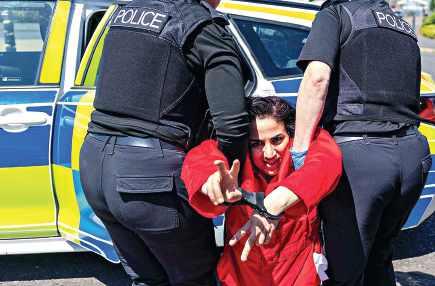

before it was proscribed as a terrorist organisation earlier this month, but subsequently closed the case, saying it did not meet the required threshold.
The organisation then opened another investigation into her earlier this year but that, despite social comments from Aladwan about “Jewish schools” in Britain and how “the UK is occupied and controlled by Jewish supremacy”, no further action has been taken.
On Tuesday, the Medical Practitioners Tribunal Service lifted the interim suspension of Dr Rehiana Ali, who has a history of spreading conspiracy theories about Jews and
talking about “Jewish extremism”. The MPTS appeared to accept Ali’s claim during her hearing that she was speaking “about Israel and Israelis”, despite considerable evidence to the contrary.
The MPTS panel acted despite the GMC supporting a continuance of the interim suspension, which was in place while the organisation investigated the reports into Ali’s conduct.
In his remarks, Streeting said he was “extremely concerned that we’ve now seen multiple instances when blatant antisemitism from NHS doctors is going unaddressed.” Continued p2; Editorial, p20
Continued from page 1
“There are cases that our country’s medical regulator should be taking seriously, and they should be taking all steps necessary to keep patients safe. I do not see the evidence that this is the case.
“So in that spirit, I’ll be hauling in the GMC’s chief executive and chair to give them that message directly and to get an account from the GMC as to why they are failing so publicly and abysmally in their responsibility to protect Jewish staff and Jewish patients, because an injury to one is an injury to all and unless we are keeping everyone safe, we cannot guarantee we are keeping anyone safe.”
The health secretary, who has been serving in the role since Labour’s victory in last year’s general election, also addressed
claims that legal issues prevented such cases being dealt with effectively.
“I gather there are excuses that the legal bar isn’t in the right place”, he said, but went on to point out that “no one’s been knocking at my door from the regulators to tell me that the regulation is in the wrong place. So forgive me if these sound like miserable excuses from the regulator.
I just cannot understand as there have been so many highprofile cases where the GMC doesn’t take action and then people are out there flouting publicly the fact that the GMC has not taken action.

“I think it is a shameful and sorry state of affairs that GMC need to account for. This goes for other regulators too.

“I’m frankly sick and tired as the person who has a responsibility to the public, as a democratically elected representative of the people, of being told by the people who are charged with regulating a life and death service, that it’s all too complicated and all too difficult.”
According to statistics from the GMC which
News has obtained, 454 complaints of antisemitism have been submitted to the organisation since 7 October 2023 about 123 individual doctors and a further 18 unidentified doctors.
Of those submissions, 84 percent, or 383, were closed at the triage stage, although Jewish News understands that this is in line with the percentage of general complaints against doctors closed at an early stage of proceedings.
Jewish News also understands that while there are cases where
a number of complaints are made about a single doctor, if the complaint progresses to a full investigation, the initial complaints would then be considered under a single investigation.
The health secretary continued his speech saying: “I’m not going to allow independence of regulators or complexity of regulation or other excuses to stand in the way of tackling this problem if we need stronger laws and stronger regulation.
“Well, they’re my favourite problems to solve because they
don’t cost money and we’ve got a majority to get things through Parliament.”
Streeting also referenced these discussions “taking place against the backdrop of the war in Gaza and Israel’s conduct in the West Bank and the appalling atrocities of 7 October.”
He said he was “not interested in silencing criticism of this government, criticism of the Israeli government or any other government” and also: “I’m not interested in silencing the political views of NHS staff.
“But what I do expect is that NHS staff show the same professional standards in the workplace that I would expect of them, that they would expect of me, that they show the same professional conduct outside of the workplace as well and think really carefully about whether their words and their actions would make their patients feel more safe or less safe.
“Because it is a special responsibility working in our National Health Service. It is a life and death service and so we have a responsibility to make sure that everyone in the NHS feels safe.
“And if we can’t do it in the NHS, then I really wonder where we’ll be as wider society.” Voice of the JN, p20
Social media personality Mohammed Hijab appeared in the witness box at the Royal Courts of Justice on Monday in a libel case he has brought against the Spectator magazine and its associate editor, Douglas Murray, writes Jenni Frazer.
Hijab, who has 1.28 million YouTube subscribers and lives in St John’s Wood – where he told the court he had many “Jewish friends and neighbours” – is suing the magazine and Murray over an article published in September 2022. The article, it is alleged, suggested Hijab had aggravated racial tension between Muslims and Hindus in Leicester, which led to violent riots in the city that summer.
Hijab claims the article caused him reputational damage and lost him financial deals as a result. He also claims it caused him “to suffer damage to his reputation, distress, humiliation, embarrassment, hurt and injury to his feelings”. The Spectator and Murray, however, say that as a public figure who has regularly engaged in controversial actions, Hijab’s behaviour is already subject to scrutiny. Any “adverse consequences” to the YouTuber stem from his own behaviour, not the article, lawyers for the magazine and Murray state.
Although Murray’s article focused on what happened in Leicester in the summer of 2022,

Hijab in front of an electronic banner asking if Jews ‘learned from the Holocaust’
his barrister, William Bennett KC, directed his questioning of Hijab in relation to his appearances at two events over the weekend of May 22 and 23 2021, in Golders Green on Saturday and the next day outside the Israeli embassy.
On his reasons for going to Golders Green on the Jewish Sabbath, Hijab said: “I wasn’t paying any attention to it being the Sabbath. It wasn’t at the forefront of my mind.”
Murray – who declined to attend the court hearing – had written that Hijab had “cropped up” in Leicester to “whip up his followers”.
The article went on to claim Hijab had told the crowd that “the Hindus must live in fear because they have been reincarnated as such ‘pathetic, weak cowardly people”.
An unwell Palestinian woman has been granted entry to the UK for private medical treatment after an immigration tribunal overturned a Home Office decision to refuse her a visa, writes Lee Harpin.
The 69-year-old, who suffers from spinal and mental health problems, argued that she had the right to visit her daughter, a UK-based charity worker, under Article 8 of the ECHR, which guarantees the right to respect for private and family life.
An upper immigration tribunal overturned the initial decision to refuse her entry, allowing her to visit her daughter in the UK and receive £55,000 worth of private care.
The Home Office had warned the tribunal that granting entry in such cases could “undermine” immigration controls and lead to a “proliferation” of similar claims from other war zones such as Gaza.
But tribunal judge Rebecca Owens ruled in favour of the woman, saying: “We find that the refusal of entry clearance amounts to an interference with this family life because the sponsor is physically unable to visit her mother in Gaza to develop their family life in that country and it is not suggested that during the current time they could spend time together elsewhere.”
She added: “We find that the appellant’s intention of coming to the UK is genuinely to access medical treatment as a visitor and have some respite. We find that she does not want to settle permanently in the UK and that the application for private medical treatment is a genuine application, which has not been made to circumvent immigration control.”
Lawyers for the Home Office said the secretary of state was “concerned about the potential proliferation of applications for entry clearance from individuals from Gaza and other conflict zones if [they] are granted entry clearance because they have a family member in the UK who has been providing them with financial or emotional support”.
The department also claimed such visits were not covered by Article 8 and that these rights generally applied only to spouses or dependent children.
A Home Office spokesman said the government’s upcoming legal reforms would add clarity to cases such as this one, adding: “The government’s new legal framework would give applicants, caseworkers and the courts the clarity they need, so that our immigration rules are applied in a way which strikes the right balance between individual family rights and the wider public interest.”
Masorti Judaism has issued an apology after its weekly newsletter appeared to suggest supporting the chant “death to the IDF” was a view worthy of being listened to “with respect and curiosity”, writes Daniel Sugarman.
The denomination’s newsletter, sent out last Friday, included the lines: “In our communities, people hold deeply opposing views on Zionism, antisemitism, and even on provocative statements like calls for the ‘death of the IDF’.
“Masorti Judaism has many communities and many people with different ways of seeing the world.
“We don’t demand agreement; we want us to stay in relationship with one another, even when we profoundly disagree.
“It’s about creating space to listen to other voices with respect and curiosity, while also speaking up clearly for what we believe in. No one person has more entitlement to their views than another.”
A few hours later, the email was
followed up by a letter from Masorti leaders, stating that in its latest newsletter “a bit of copy was published which can be misunderstood.
“We attempted to describe the reality of our current moment — where we are often debating what the limits of free speech are. When a musical act chants for the death of our soldiers from the stage of Glastonbury however, our opinions on that should not be up for debate.”
The letter went on: “We sought to use an example of the free speech debates we face, and chose poorly. The wording of this particular post was ambiguous, and allowed it to be read differently to its intention.
“We want to be clear: calling for the death of Israeli soldiers is not free speech, it is hate speech. It is incitement and it is dangerous – to the IDF and to Jews here in the UK.”
This is not the movement’s first brush with controversy in the past 21 months. In May 2023, Jewish News reported Rabbi Lara Haft Yom-Tov, a community rabbi at the

movement’s flagship New North London Synagogue, had described Israeli politicians as “war criminals who have forced Palestinian families to flee their homes”.
Writing in Let All Who Are Hungry Come and Eat, part of an alternative Haggadah supplement, Yom-Tov, who asks to be referenced using they/them pronouns, also dismissed those who will “lift up their matzah and wax poetic about the
Leeds MP Alex Sobel’s decision to sign a letter calling for Britain to recognise a Palestinian state and press for the “unhindered resumption of humanitarian aid” has been criticised by Leeds Jewish Representative Council.
The letter was created by the co-chairs of the Labour Friends of Palestine and the Middle East, MPs Sarah Owen and Andrew Pakes.
Sobel was one of two Jewish signatories with Charlotte Nichols in a group of MPs who include Naz Shah, Bell Ribeiro-Addy, Rosena Allin-Khan and Dawn Butler.
Addressed to foreign secretary David Lammy, the letter was apparently triggered by Israeli defence minister Israel Katz’s announcement of his plans for Palestinians remaining in Gaza.
The writers describe the plans as “ethnic cleansing” and say there should be “recognition of the state of Palestine” and “continuing support for UNRWA”, which is “uniquely placed to provide support and services to Palestinians across the Middle East”.
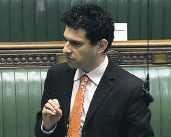
The letter does say securing the release of hostages is important and it is “unfathomable” Hamas continues to “cruelly detain” those taken in October 2023 who “have been subject to cruelty, appalling conditions and unimaginable torment. They must be released immediately and unconditionally.”
Simon Myerson KC of the Leeds Jewish Representative Council told Jewish News: “I have no problem with a call for resumption of aid, but Israel and the Jewish community have a profound distrust of UNRWA for well-founded reasons to do with obvious cooperation with Hamas, which it refuses to accept or explain.
“The call for the immediate recognition of Palestine without calling for the sur-
render of Hamas may be wellmeaning and well-motivated – but it is naive in the extreme.
“We do not believe a parliamentarian in a proud democracy should ever suggest anything that rewards terrorism. No doubt this was not the aim – but it is the effect.”
He added: “We are also disappointed Mr Sobel aligns himself with parliamentarians whom the Jewish community has every reason to distrust. It is a matter for him, but we would prefer him not to have done so”.
Myerson noted Lisa Nandy, a member of the group and secretary of state for culture, media and sport, had not signed the letter although as a Cabinet member she would not be able to do so.
He also made it clear Sobel’s decision to sign the letter was not discussed with the Leeds Jewish community, nor with Jewish students at Leeds University. Sobel’s seat includes the area where the university is sited and many students eligible to vote during term-time are among his constituents.

Israelites’ rush to escape Egypt”, and said the “same politicians who have manufactured a famine in Gaza, leading millions to the brink of starvation, will proudly declare ‘Let all who are hungry come and eat’.”
New North London undertook an internal investigation. While the disciplinary process led to a finding of serious misconduct, the shul’s council voted unanimously not to dismiss Yom-Tov.


Hundreds of BBC staff were working for the broadcaster at Glastonbury, including individuals who had the authority to cut the Bob Vylan livestream presentation during the controversial performance, the company’s director-general has said.
The frontman of the punk rap duo Bob Vylan led crowds in chants of “death, death to the IDF” during their set at the music festival.
Police have since launched an investigation, with the BBC issuing an apology for the livestream and promising it will no longer broadcast live acts it deems “high risk”.
Responding to questions from culture, media and sport committee chair Caroline Dinenage MP, the director-general, Tim Davie, said: “Cutting the livestream was an option open to those on the ground on the day.
“There were failures in our coverage which led to offensive content being broadcast live.
“I deeply regret that such deplorable behaviour appeared on the BBC and want to apologise to our viewers and listeners and in particular the Jewish community.”


A shocked audience of more than 400 people listened in silence as two of the best-known former hostages in Gaza, Aviva and Keith Siegel (pictured with the Chief Rabbi), recounted their harrowing experiences at the hands of their Hamas captors, writes Jenni Frazer.
And then the audience at Finchley Synagogue rose in applause for a couple who Chief Rabbi Sir Ephraim Mirvis called “true heroes of the Jewish people”.
In the hour-long event — held jointly under the auspices of the United Synagogue, the Israeli embassy and the Office of the Chief Rabbi — the Siegels were engaged in conversation with Sir Ephraim as he gently teased out their ordeal.
Aviva Siegel, her South African accent still strong despite having arrived in Israel when she was just eight years old, was released after 51 days in captivity; her husband Keith, who was born in America, was held in Gaza for 484 days, only having been freed in February this year.
The couple, married for more than 40 years, were kidnapped from their kibbutz near the Gaza border, Kfar Aza, on 7 October 2023, being dragged through the window of their home by a group of Hamas terrorists, injuring Keith in the process. Aviva Siegel painted a picture of utter confusion at the start of the attack as they tried to find out through a kibbutz WhatsApp group what was happening. Shai, their son, is the only one of their four children to have lived on the kibbutz and Aviva did not know whether or not he had been kidnapped too.
Kfar Aza lost 64 of its members on 7 October, but Aviva Siegel said all of the kibbutzniks were wearily familiar with the constant rocket attacks from Gaza, which was why she and Keith had initially tried to hide in their bomb shelter.
For the duration of her captivity in Gaza, she and Keith were held together, spending the first three days in a tunnel and then moved — sometimes with one or two other female hostages — to a variety of other

underground locations. They were moved 13 times during her 51 days in Gaza; Keith, however, was relocated 33 times before his release, suffering and witnessing “severe abuse, physical, verbal, sexual…”
The couple were repeatedly told that Israel no longer existed, so that when Aviva was told she was to be released, she did not know whether to believe her captors or indeed to
where she might be released.
When she was first captured, Aviva Siegel said: “It seemed like the end of the world.” She recalled the experience of a young woman captive who had clearly been sexually abused by a Hamas terrorist, but who refused to acknowledge that in front of her captors. “She told me that the Hamas man had touched her,” Aviva said, adding that she her-
Grieving relatives of hostages still held in Gaza issued an emotional appeal for help during a powerful meeting at the Board of Deputies offices in London, warning current ceasefire proposals risk abandoning their loved ones, writes Annabel Sinclair.
The families – whose sons were among those kidnapped on 7 October – urged British Jewish leaders, journalists and campaigners to press international mediators for a deal that ensures the return of all hostages, living and dead.
Hosted by the Hostages and Missing Families Forum UK, the private gathering united families of five young men abducted during the Hamas attacks: Sahar Baruch, Oz Daniel, Matan Angrest, Evyatar David and Bipin Joshi. Several have been confirmed killed in captivity, though their bodies remain in Gaza.
Among those who travelled to the UK were Oz’s mother Merav Daniel, Sahar’s mother Tami Baruch, Evyatar’s mother Galia David, Matan’s grandmother and sister Rina and

Adi Angrest, and Adi Radai, a close friend of Bipin Joshi’s family in Nepal.
The meeting came as Israel signalled initial acceptance of a US-backed proposal for a 60-day ceasefire in Gaza.
The plan under discussion envisaged Hamas releasing 10 living hostages and the bodies of 18 more in return for a phased truce, the release of Palestinian prisoners and limited Israeli withdrawal from parts of the territory. The release of the remaining hostages – including dozens still unaccounted for – would be contingent on a permanent ceasefire being reached during that period.
But for the families in London, the proposed partial
deal is a source of anguish.
“We want all of them back,” said Galia David, whose 23-year-old son Evyatar was kidnapped from the Nova festival. “We want to hug our sons. We want to say ‘You are safe now.’ But we couldn’t say it on 7 October –and we still can’t.”
Merav Daniel, whose son Oz was taken from his tank unit, recalled clinging to hope for 142 days after a Hamas video showed him alive. “Then we were told he was gone,” she said. “We haven’t had a funeral. We buried a stretcher soaked in his blood and body armour. Now we pray that those who are still alive return – and the dead can be laid to rest with dignity.”
Several relatives voiced frustration not just with Hamas but with their own government. “Israel is not fighting for my son,” Merav Daniel said. “Every soldier joins the army thinking the State will look out for them – but to this day, not one serving soldier held hostage has been brought home by military action in Gaza.”
UK lead of the Hostages and Missing Families Forum Nivi Feldman added: “Sometimes, families find out information through Telegram or the media before they hear about anything official. There’s no clarity. No transparency.”
Tami Baruch said Sahar, her 25-year-old son, was murdered in captivity after trying to retrieve an inhaler for his wounded brother during the attack on Kibbutz Be’eri.
Board of Deputies chief executive Michael Wegier and senior vice president Adrian Cohen, assured the families of the community’s ongoing support. “We will continue to raise your voices,” Cohen said.
self felt that “I had touched death.” Aviva and Keith were separated on day 51 of her captivity, though she did not want to leave her husband. Both of them lost weight, were frequently starved and not given access to water, and at one point were kept in an area where they found it difficult to breathe.
Keith Siegel, still gaunt after his release five months ago, said his captors tried repeatedly to convert him to Islam, telling him that “only Muslims go to heaven” and that they did not understand why he, an educated man, remained a Jew.
But he said that this approach only made him more determined to make his Jewish identity stronger, and said that he had become “motivated” to recite Jewish prayers in Gaza that he had not said since he was young. “I found strength in belonging to the Jewish people,” he said.
The event was the first formal engagement for Saul Taylor, the newly-elected president of the United Synagogue.
A British mosque has been warned formally by the Charity Commission after an investigation found it shared a video appearing to glorify Hamas and justify the 7 October attack on Israel.
The Al-Manar Centre Trust, which operates a mosque in Cardiff, was found to have committed misconduct and mismanagement when its chair posted the video on the charity’s social media account in November 2023 without reviewing the full content.
The commission concluded the video gave a “positive image” of Hamas, which is banned in the UK as a terrorist organisation.
The inquiry found the footage “attempts to downplay or justify” the Hamas attack, in which around 1,200 people were murdered and more than 250 taken hostage.
The post was likely to lead an ordinary member of the public to infer the charity supported or glorified terrorism, it added.
The chair of trustees, who was responsible for managing the charity’s social media, told the commission he had lis-

tened only to the audio before sharing the post, believing it aligned with the trust’s objectives of Islamic education and religious harmony.
The regulator described this as “wholly inadequate”, as the narration alone should have raised red flags.
Head of compliance visits and inspections Joshua Farbridge said: “There is no excuse for failing to properly review content before it is shared by a charity.
“Our swift intervention, which included an official warning and a legal order requiring specific action to be taken, underscores the Commission’s firm commitment to ensuring charities are not misused in supporting or glorifying terrorism.”
A Brighton rabbi used his Shabbat ser vice, attended by members of the Board of Deputies, to lambast publicly the organisation’s handling of deputies who signed a letter condemning Israeli military action in Gaza, writes Adam Decker.
Rabbi Gabriel KanterWebber of Brighton and Hove Progressive Synagogue addressed the issue during his sermon in a service coinciding with the Board’s ple nary in the city.
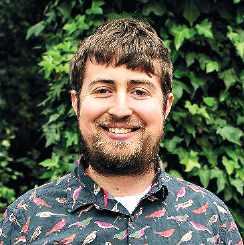
Among those present were several deputies and the Board’s chief executive, Michael Wegier.
The rabbi condemned the Board’s decision to sanction 36 deputies who signed a letter to the Financial Times in April, which accused the Israeli government of breaking the ceasefire and reigniting the war in Gaza. He said the signatories had acted “in the name of heaven”.
The letter stated: “Israel’s soul is being ripped out and we, members of the Board of Deputies of British Jews, fear for the future of the Israel we love.” It added that silence was being interpreted
as support for policies “contrary to our Jewish values”.
Last month, 31 of the deputies had warning letters sent to their synagogues.
The other five, some of whom had given media interviews after the letter putting forward their position was published, were suspended from the Board for two years, with three of them given the opportunity “reduce the suspension to six months by way of an apology to affected parties” – an offer they rejected.
Kanter-Webber told his congregation that “there is a fundamental message here that the Board of Deputies overlooked when saying to itself ‘Will no-one rid us of these turbulent Liberal and Reform members?’
“The 36 deputies who signed the Financial Times letter, and the five who allegedly aggravated their sin of signing it by doing extra-bad things like sharing it with friends on Facebook, were not mounting a coup. They had no interest in trying to overthrow the leadership of the

Board. No. What they were doing was an act of thought leadership for the benefit of the wider community. Not everyone was going to follow them; not everyone will follow any leader. However, what they were doing was, without a shadow of a doubt, for the sake of heaven.”
Kanter-Webber also called out the Board’s chief executive directly, saying: “Here I am today, looking the Board of Deputies’ chief executive in the eye and telling him just how poorly his institution has behaved.”
Jewish News understands despite KanterWebber also saying he had known Wegier for many years and that “I’m sure he’ll have been expecting me to deliver a word of rebuke”, the Board had been unaware that the rabbi would choose to conduct himself in such a fashion during his sermon.
Wegier apparently was given an opportunity to address congregants a little later during the service and told those present Kanter-Webber’s statements about the Board’s conduct were inaccurate.
Jewish News also understands there has been friction between the Progressive Movement and the Board as a result of the sanctions on the deputies. Every one of the 36 representing a synagogue came from the Progressive Movement.
Home secretary Yvette Cooper has said the UK government is taking “immensely seriously” threats from Iran to prominent Jewish and Israeli citizens living in this country after a new security and intelligence report issued a stark warning.

She said she was in close contact with the Community Security Trust, MI5 and Counter Terrorism Police over the growing problem after parliament’s intelligence watchdog warned the threat of physical attacks by Iran on people living in the UK had increased “significantly” since 2022.
The report said Iran’s intelligence services were “willing and able – often through third party agents – to attempt assassination within the UK, and kidnap from the UK”. And while the threat is often focused on dissidents and other opponents to the regime, the report said there is also an increased threat to Jewish and Israeli interests in the UK. Appearing on LBC, Cooper noted there had been operations and arrests involving Iran-backed plots and security was being strengthened. She also confirmed the government intends to proscribe the Islamic Revolutionary Guard Corps. • Opinion, page 24
The Royal Academy of the Arts has been condemned for exhibiting “antisemitic” art works in its summer exhibition for the second year in a row, with the country’s preeminent art institution accused of not taking Jewish visitor’s concerns into account, writes Daniel Sugarman.
UK Lawyers for Israel (UKLFI) has written to the academy about two works by RA member Michael Sandle.
Terrorist versus smiling mass murderer of innocents, shows what appears to be a Hamas terrorist next to an Israeli air force pilot and is priced at £6,000.
A second work, a slightly larger variant on the first and priced at £25,000, is titled Apropos terror – a pilot doesn’t hear the screams of the women and children he is massacring with impunity
There was anger within the Jewish community last year at another work by Sandle, The mass slaughter of defenceless women and children is not how you deradicalise Gaza , depicting a faceless
pilot in an aircraft emblazoned with a Star of David.
Two works submitted by students as part of the RA’s youth competition, one of which seemingly compared Israel’s war with Hamas in Gaza to Nazism, were withdrawn from the RA’s exhibition, but Sandle’s work remained.
UKLFI said it had written to the RA’s new chief executive “explaining why the two drawings are antisemitic, and asking for their removal from the exhibition”.
It added: “The titles of both these drawings imply Israel is purposely slaughtering women and children on a mass scale. This is far from the truth, since the Israeli army does all it can to avoid harming women and children while targeting Hamas terrorists who unfortunately use women and children and human shields…”.
UKLFI said Israel had killed “far fewer” civilians in proportion to the number of terrorists killed than other countries during urban warfare. “While every civilian that is killed is of course a tragedy, this

is unfortunately inevitable during a war being fought in urban areas,” it added.
The group said the pictures submitted by Sandle therefore “apply double standards by requiring of Israel a behaviour not expected or demanded of any other democratic nation, which can be antisemitic according to example eight
of the IHRA working definition.
“The titles of Michael Sandle’s drawings… claim that Israelis (or Jews) are carrying out a mass murder of innocent women and children with impunity.
“Accusing Jews of murdering babies or children is an enduring blood libel. Michael Sandle should be aware that Israel aims to kill
More than 100 teenagers from 10 London schools have been recognised for their commitment to interfaith and social action at the 2025 Alan Senitt Upstanders Leadership Programme graduation ceremony.
Held on the 19th anniversary of Alan Senitt’s death, the event paid tribute to the late Jewish activist’s legacy of tolerance and civic leadership by showcasing student-led projects addressing inequality, discrimination and poverty.
Run by Maccabi GB through its educational initiatives Stand Up! Education Against Discrimination and Streetwise, the seven-month programme brought together pupils from Jewish, Muslim, Sikh and non-faith backgrounds to build leadership skills and forge bonds across communities.
Participating schools included JFS, Immanuel College, JCoSS, Yavneh College, King Solomon High, Hendon
School, Copthall School, Nower Hill, Guru Nanak Sikh Academy and Watford Grammar School for Boys.
Each school group developed its own anti-discrimination initiative. One team tackled low literacy rates at a local primary school by organising a book drive and creating their own vocabulary-rich children’s story. Another partnered with a hospital’s ‘Parent in Need’ team to distribute baby packs – complete with bottles, nappies and blankets – after securing donations from high street retailers. A third group addressed child poverty by preparing more than 200 packs with food, toys and activities for a charity Easter event.
Senitt’s sister Emma, who gave the keynote address, told students:
“You’ve shown us what it means to be an Upstander, not a bystander. You’ve led with empathy. You’ve built bridges. You’ve created change.”

Reflecting on her brother’s memory and achievements, she added: “Alan was a passionate leader, a bridge-builder and a believer in community. He worked across backgrounds and faiths, always lifting others up and believing that together is better than apart.
“Next year marks 20 years since Alan’s death, and while we miss him every day, what we see in this room –and in the alumni who came before you – is the legacy of his values: courage, compassion, leadership and action.”
The graduation ceremony opened with a welcome from Streetwise Project manager Abi Wander, who praised the young leaders and celebrated the success of the revamped programme.
Maccabi GB chairman Jonathan Prevezer also addressed the graduates, sharing reflections on the programme’s lasting impact and his hopes for the cohort’s continued leadership journey.
Facilitators delivered eight fullday seminars and individual school visits throughout the year, incorporating interactive workshops, leadership training and sessions from antidiscrimination experts. Students then devised and fundraised for their projects, many of which will leave a lasting legacy in their schools.
The 2025 graduation marked the largest cohort in the programme’s history, demonstrating growing demand for youth-led action in an increasingly polarised world.
terrorists, not innocent children and others.”
Jewish News understands the academy does not have the ability to block submissions from members of the academy, nor the power to expel academy members.
This ultimately belongs to the Sovereign and has previously been used only when a member has been found guilty of a crime such as murder.
The academy said: “Works in the exhibition often reflect current societal and political topics. Inclusion of works ... should not be read as the RA supporting any particular artist’s point of view.
“We always take all concerns about artworks on display in the Summer Exhibition seriously; however, our role, as an artist- and architect-led organisation is to allow all artists the ability to express themselves.
The Royal Academy is an organisation led by artists and architects and is committed to freedom of expression.”
Culture wars, pages 8-9
Saul Taylor, at 43 the youngest of three candidates, has been elected president of the United Synagogue, clearing more than twice the votes of his nearest rival Claire Lemer, with 144 against her 71. Marc Meyer, French-born former chair of Hendon Synagogue, finished third with 27, writes Jenni Frazer.
Describing his election as “the privilege of my lifetime”, Taylor thanked his rivals, who he said had fought a “fair and honest” campaign in the bid to succeed outgoing president Michael Goldstein, retiring after eight years in office.
In his first speech to the US Council, Taylor recalled the two films made about the wartime initiative of Lt Cmdr Ewen Montague, whose idea to dress up a corpse in a British army uniform, complete with fake papers, to fool the Nazis, became known as Operation Mincemeat
Montague later became president of the United Synagogue, with Taylor saying he was “deeply aware of the weight of this office and the quality of former leaders”,
Taylor pledged his commitment “to representing the communities. I will fight every single day, both alongside you and for you to make sure our United Synagogue remains the home for all our families for future generations — and that work starts right now”.
Among the first to congratulate the new leader was Board of Deputies president Phil Rosenberg, who said: “Mazaltov to Saul Taylor… his election shows the leadership of the community moving to a new generation.”
In his final address as president, Goldstein reflected on the challenges of the past eight years for the 56 communities of the US, including dealing with Covid and fallout from 7 October.
But as well as the challenges, he said, there were highlights, including spending £50 million on rebuilding existing communities and growing new ones – particularly the brand new Mill Hill East – and bringing four provincial communities under the US umbrella.
Michael Goldstein, p23


























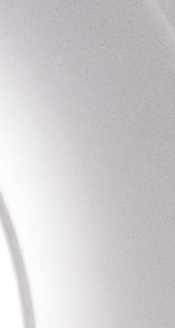





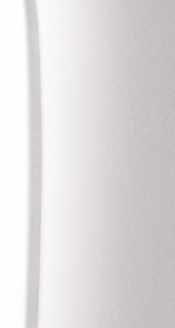




In the wake of last month’s chilling scenes at Glastonbury, Daniel
tracks 21 months of hate and discrimination across British arts and culture
OCTOBER 2023
• Tracy-Ann Oberman, starring in Merchant of Venice:1936, reveals that the touring production has had to hire extra security due to the surge of antisemitism post-7 October.
NOVEMBER 2023
• At the Grierson Awards, held annually to celebrate British documentaries, a female guest makes antisemitic remarks to a number of Jewish TV industry figures present. The Grierson Trust subsequently apologises and announces a ten-year ban for the individual in question.
DECEMBER 2023 – JANUARY 2024
• Channel 4 receives significant backlash in response to its alternate Christmas message, which featuring Stephen Fry talking about the sharp rise in antisemitism. Fry receives significant abuse and condemnation. Former Channel 4 Commissioner Tamara Abood describes Fry’s speech as was “disingenuous” and demonstrated “where the power lies” in UK media. In January the chief executive of one of the UK’s diversity bodies is accused of liking some of Abood’s other statements on social media, including posting a video of anti-Zionist Jew Alexei Sayle claiming that other Jews were “bloviating” over the Gaza conflict and parroting the narrative of the “ruling class establishment, saying “Unlike the disingenuous… Fry version, this is a Christmas message I can get behind.”
FEBRUARY 2024
• Comedian Paul Currie tells a Jewish man to leave his show at the Soho theatre after they did not stand and applaud him at the end of his show, due to his use of a Palestinian flag during

his act. The theatre gave Currie a lifetime ban – the comic later attempted to sue the theatre. In August the comedian goes on to say that ‘Zionists’ shouldn’t attend his shows at the Edinburgh fringe festival.
• The BBC initially declines to do anything about an Apprentice contestant, Asif Munaf, discovered to have posted highly o ensive social media posts, including referencing “the Zionist antichrist”, claiming “the Zionist PR machine is slimy” and posting the question: “Have you ever met even a semi-average looking Zionist? Aren’t they all odiously ogrelike?” He labelled Zionism a “satanic cult”. Eventually, after weeks of significant Jewish communal outcry, the BBC cuts Munaf from You’re Fired, the spin-o to the Apprentice, before his episode airs.
MAY 2024
• Comedian Dane Baptiste sends a public death threat to a female Jewish comedian –who he described as a “Zionist comedian” – on social media. He is subsequently let go by his agent.

• An organisation calling itself Fossil Free Books mounts a campaign pressuring literary festivals to drop their sponsorship agreements with Baillie Gi ord, an investment management firm with some investments in Israeli companies. The initial focus is on the Hay Literary Festival, with Fossil Free Books convincing scores of prominent individuals, including authors and politicians, to sign up to their campaign. The Hay Festival capitulates and announces that it is cutting ties with Baillie Gi ord. The company subsequently makes known that it is cancelling its sponsorship deals with a wide range of other literary festivals.
• The Phoenix Cinema in East Finchley, which is screening movies for the Jewish Film Festival, is targeted by anti-Israel protestors, who deface the cinema. Members of the Jewish community and other Israel supporters turn out in counter-protest.

• Tracy-Ann Oberman has to hire additional security after death threats.
JUNE 2024
• Keshet UK, the British Jewish community’s LGBT+ charity, says that it has felt the need to pull out of London’s pride parade because the safety of Jewish attendees could not be guaranteed.
AUGUST 2024
• Comedian Reginald D Hunter gets into an altercation with two Jewish audience members who take issue with a joke about Israel at his Edinburgh fringe performance. A Daily Telegraph critic was present. Once the Jewish people left, the comedian tells a ‘joke’
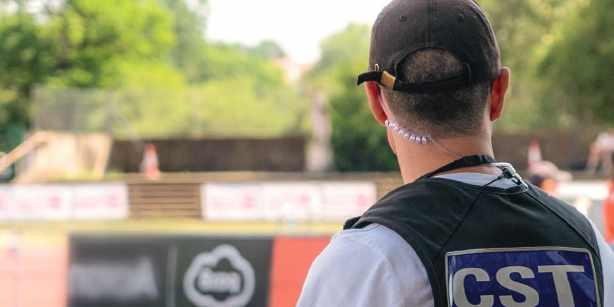
Protecting and securing the Jewish community in the UK against antisemitism is what we do. CST will leave no stone unturned in the fight against those who wish to do us harm.
We need your ongoing and long-term support to continue our work.


featuring his wife, in which he quotes her as saying about a Jewish newspaper with a paywall: “Typical f***ing Jews, they won’t tell you anything unless you subscribe.”
• Anti-Israel campaigners are accused of harassing attendees of a performance of Fiddler on the Roof by the Regent’s Park open air theatre.
• A gay nightclub in London publicly announces that it wants “no f***ing Zionists” in the venue, and that “Zionism has no place in queer spaces”. After significant anger, the nightclub apologises and retracts its “no Zionists” comment.
OCTOBER 2024
• The chief executive of UK Jewish Film, Michael Etherton, warns that Jews are being “erased” from culture. He cites multiple examples of venues across the country who had previously screened UK Jewish Film

festival o erings either ignoring contact or suddenly claiming to have no availability. He largely attributes this due to venues not wanting to deal with inevitable protests.
More than 1,000 authors and artists, including Sally Rooney, Arundhati Roy and Rachel Kushner, call for a boycott of Israeli cultural institutions, and pledging not to work with any publishers, festivals or publications ‘complicit in violating Palestinian rights’. Another letter, also signed by more than 1,000 artists, condemns the cultural boycott.

NOVEMBER 2024
MAY 2025
• A campaign is run by an activist group called Bands Boycott Barclays, calling on music festivals to divest from the bank due to its ties to Israeli companies – and on bands to withdraw from festivals which maintain Barclays as a sponsor. Barclays subsequently withdraws from sponsoring a wide range of festivals
• The Grierson Trust appoints Oscar-winning documentary director Asif Kapadia as a patron, sparking considerable anger due to Kapadia’s highly inflammatory social media posts. These include a comparison between the Holocaust and Gaza, and a cartoon of Benjamin Netanyahu dining at a blood oaked table with a baby on it, with the caption overhead reading “Kosher”. Grierson subsequently removes Kapadia as a patron and apologises for a lack of due diligence.
• Goldsmiths’ Centre for Contemporary Art at the University of London announces that it will remove the names of Candida and Zak Gertler from one of its galleries. In May and June, students from the ‘Goldsmiths for Palestine” group occupied the gallery for 27 days.More than 1000 artists call on the Tate gallery to divest from Outset, the arts charity co-founded by Candida Gertler, over the couple’s ties to Israeli Prime Minister Benjamin Netanyahu. Candida Gertler subsequently resigns from all her positions in art institutions in the UK, including from the Outset board.She says her actions are “a principled protest against the alarming rise in antisemitism”, and that ”the failure to confront such hate compromises the very essence of what art stands for – a medium for empathy, exploration and shared humanity.” Candida Gertler steps down from Outset Contemporary Art Fund citing ‘alarming rise of antisemitism’ in cultural spaces.
JANUARY 2025
• Renowned theatrical director Sir Nicholas Hytner tells the Jewish Labour Movement conference that “younger Jews in the theatre” are being subjected to a “loyalty test” as to where they stand on Israel.
• Keshet UK, confirms that it will not be organising the Jewish bloc at London’s pride parade this year either, accusing event organisers of failing to support the safety of Jewish LGBT+ participants.
Following repeated protests by sta members, who object, among other things, to serving Coca-Cola due to links to Israel, the board of the Glasgow Film Theatre make it clear that the institution will not be participating in a full boycott of Israel. Multiple board members resign as a result of this decision, and the theatre faces calls for a boycott.

• Protestors repeatedly try to disrupt the London filming of a movie starring Israeli actress Gal Gadot, citing her service in the IDF and her support for Israel. Multiple people are arrested and Gadot has to be evacuated from a movie set. The actress is left reportedly “reluctant to ever film in London again”.
• Two planned concerts by Radiohead’s Jonny Greenwood and Israeli Dudu Tassa are cancelled, in London and Bristol. The duo note that “while we have no judgment to pass on Kneecap, it’s sad that those supporting their freedom of expression are the same ones most determined to restrict ours.”



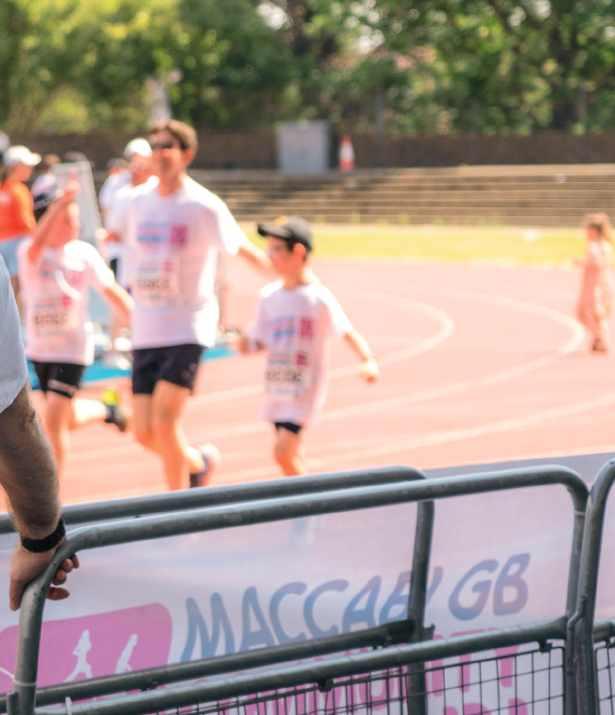
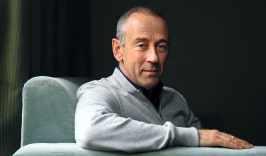
APRIL 2025
• The band Kneecap have become known for their inflammatory statements on the Israel-Palestinian conflict (including sharing a photo of one of their members reading a book of statements by Hezbollah leader Hassan Nasrallah in February 2025).At the Coachella festival in California, the group claims “Israel is committing a genocide…abetted by the US”, and state “fuck Israel – free Palestine.” Shortly afterwards, UK counter-police announce that they are opening an investigation due to other actions from Kneecap, including the statement that “the only good Tory is a dead Tory. Kill your local MP” at a concert, and one of the trio’s members waving a Hezbollah flag on stage during another concert, as well as shouting “Up Hamas. Up Hezbollah”.• Numerous prominent bands and musicians sign an open letter condemning the opening of the investigation into Kneecap.

• Planned concerts by prominent Klezmer group Oi Va Voi are cancelled in Bristol and Brighton, due to claims by anti-Israel activists that the cover art of a release from one of the bands members was “anti-Palestinian” because it showed her harvesting watermelons, which have become a symbol of Palestinian resistance.
• Comedian Dawn French posts a video on social media in which she appears to mock those who cite the mass murders which took place on 7 October. After outrage, French deletes the video and apologises, saying her intention was never “to mock, or dismiss, or diminish the horror of what happened”
• In an interview for the Radio Times, Rod Stewart engages in Holocaust inversion, stating: “What Netanyahu is doing to the Palestinians is exactly what happened to the Jews.”

• Despite a public outcry, Glastonbury refuses to cancel Kneecap’s performance. However, the band that attracts the most attention is punk/hip-hop duo Bob Vylan, whose frontman leads a Glastonbury crowd in chants of “death to the IDF” and rants about “Zionists”. The BBC is widely condemned for not cutting away from the performance, and later apologises, as do Glastonbury’s convenors. Local police announce that they are opening a criminal investigation into both Kneecap and Bob Vylan’s performances. Both the band’s talent manager and agent announce they are dropping the group and the US state department announces revocation of a visa.
We don’t want anybody else to go through what we’ve been through,” Esther Hyman tells Jewish News, reflecting on a recent national milestone few families would choose to mark. “If we can use education to prevent even one more family from suffering, then it’s worth everything.”
Her younger sister Miriam – known as Mim – was just 32 when she was killed in the 7/7 London bombings, one of 52 victims of the coordinated suicide attacks that rocked the capital on 7 July 2005. She had been on her way to a work meeting in Canary Wharf when her train was evacuated due to an earlier explosion.
With no information available, she boarded a bus to continue her journey. It was the No. 30, which exploded in Tavistock Square. Miriam was sitting directly in front of the bomber.
“She was a bubble of love,” says Esther, recalling her sibling with warmth and clarity. “She gave the best cuddles in the world. She was incredibly generous and very positive – my closest confidant.” Three years younger, Mim was also “incredibly gregarious”, she says. “She loved people and she was loved by people.”
An artist in her own right who studied the history of art at university, Miriam worked as a picture researcher and was a dedicated volunteer, including with children and peace groups. “She demonstrated against the war in Iraq,” says Esther. “The irony is not lost on us.”
The family was notified of her death the Monday following the attack. “It was extremely shocking. The aftermath lasted for months – years – because the events were constantly being referred to in the media,” she recalls. “You’d switch on the TV or the radio, and there’d be another reference to it. It knocked you for six every time. You have to develop strategies to cope, otherwise you just break down.”
What if it was your sister? What if it was your son or daughter? We don’t want anybody else to go through what we’ve gone through
Three years later, Esther and her parents, Mavis and John, established the Miriam Hyman Memorial Trust (MHMT), initially as a way of raising money in her name. They used their compensation to fund the launch of the Miriam Hyman Children’s Eye Care Centre in Odisha, India – a partnership with the LV Prasad Eye Institute that continues to treat children regardless of their ability to pay.
“Miriam was short-sighted and appreciated her own eye care,” Esther explains. “That’s Miriam’s living memorial. It still exists, it goes from strength to strength.”
Miriam Hyman (second from left) with her sister Esther, and their parents John and Mavis, in a cherished family photo taken before the 7/7 London bombings. Photo: Courtesy
But it was the fact that one of Miriam’s killers was just 18 years old that shaped

the family’s long-term mission: prevention through education. “He had obviously been radicalised at a very young age,” says Esther.
“So, we thought – we need to reach young people before that can happen.”
Seven years in the making, Miriam’s Vision: Working for Community Cohesion was launched in 2015 to coincide with the tenth anniversary of the bombings. A free, classroomready resource for teachers of 11-to-14-yearolds, it is built around the UK national curriculum and uses Miriam’s story as a springboard to explore core themes of democracy, empathy, resilience, rights and diversity. “Miriam’s Vision proposes democracy as a viable alternative to extremism,” Esther explains. “It’s about understanding each other’s experiences and building a society that makes radicalisation harder.”
In 2018, MHMT conducted a formal evaluation. The results were striking. “We found that it works extremely well in the classroom,” she says. “Young people relate to her story because it’s the story of an individual – and the response to her death. One Muslim student said
the atmosphere in their class changed for the better after using Miriam’s Vision – that there was no longer any aggression around culture. That’s huge.”
MHMT submitted a detailed proposal to the Department for Education’s Curriculum and Assessment Review in 2024, setting out the case for social cohesion to be explicitly included in what children are taught. Earlier this year, the review’s interim report briefly mentioned social cohesion in its executive summary – a line Esther cautiously welcomes. “It gave us hope,” she says. “But because it wasn’t specified later in the document, it didn’t reassure us. So, we’re putting pressure on the government to commit to it.”
Asked what success would look like, she doesn’t hesitate: “That schools are obliged to teach about social cohesion. That it’s written into the curriculum. That teachers have to address it – and if they return to Miriam’s Vision

Despite this impact, however, Esther admits uptake has been disappointingly low.
“There are so many barriers,” she says. “The biggest is time. We made it as easy as possible for teachers to use – everything is there, lesson plans and all – but if it’s not in the national curriculum, it won’t be prioritised.”
As a result, she says, “We’ve realised we’ve been banging our heads against a wall trying to get teachers to take it up.”
The Trust has now shifted focus from promoting Miriam’s Vision to lobbying for a broader goal: the inclusion of social cohesion as a named element in the UK’s forthcoming revised curriculum. “We’re not asking for Miriam’s Vision to be included,” Esther says clearly. “We’re asking for social cohesion to be addressed. That’s the vital point.” The goal is that these issues are taught, full stop.
to do that, wonderful. But that’s not the goal. The goal is that these issues are taught, full stop.”
The cost of failing to act, she warns, is dangerously high. “More violent extremism will be perpetrated on our society,” she says. “More families will have to go through the heartbreak we’ve been through. That’s what’s at risk.”
Pressed on her message to policymakers, Esther speaks not as a campaigner but as a bereaved sister. “What if it was your sister?” she asks. “What if it was your son or daughter? We don’t want anybody else to go through what we’ve gone through. We urge the government to use education effectively for something worth learning – how we treat each other. If someone has grievances, how do they air them? If people have rights – like the right to life – how do we respect those rights and still get our point across? These are themes we believe should be taught in every school.”
Whatever happens with the curriculum, she confirms that Miriam’s Vision will remain freely accessible online for teachers worldwide. “We may or may not continue to exist as a registered charity, depending on the outcome of this review, but we’ve done the work. The resource is there for anyone who wants it.”
Asked finally how she hopes Miriam will be remembered, Esther pauses. “We’ve worked hard to honour her memory,” she says. “We hope our efforts will make a lasting difference.”






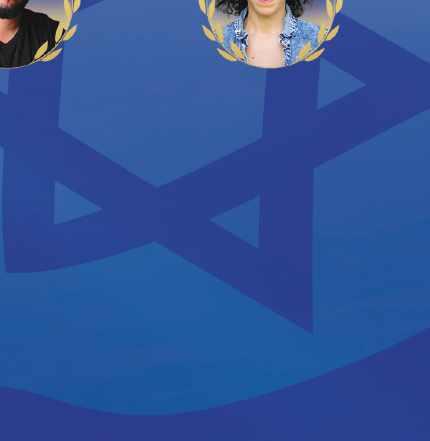
This show tells the story of Israel and its first university, born from a Zionist dream more than 120 years ago that transformed into a global scientific powerhouse. Through the eyes of students, faculty, philanthropists and leaders across generations, this show tells the story of Israel’s history and chronicles groundbreaking achievements, enduring hardships and the Technion’s pivotal role in shaping the state of Israel.



Professor Liran Shlush tells Annabel Sinclair how he managed to rescue vital samples after Iran’s strike, then published a cancer breakthrough days later
When an Iranian ballistic missile tore through the Weizmann Institute of Science in Rehovot last month, Professor Liran Shlush feared everything he had worked towards for the five years had been lost.
His team’s lab, one of around 45 affected in the 15 June attack, was based in a building that was “badly damaged, but not destroyed,” he said. The other half, he added, was “completely destroyed”.
“We lost around one quarter of what I define as irreplaceable,” Shlush told Jewish News. “But the rest – we were able to rescue.”
His voice was calm, but the reality was anything but. “We came very early after the missile – about an hour later – and saved everything we could,” he said. “Some of the freezers were buried under the ruin, so we couldn’t reach those. But the rest – the samples from patients we’d collected, that were frozen – we managed to recover.”
Among them were vials of material intended for a large-scale, international clinical trial – part of the next phase of a study that may now help revolutionise blood cancer diagnosis.

Just one week after the strike, Nature Medicine published the results of that research: a study showing that rare stem cells which occasionally migrate from bone marrow into the bloodstream can be used to detect myelodysplastic syndrome (MDS), a condition that can progress into acute leukaemia.
Crucially, the test – developed in collaboration with Prof. Amos Tanay and a wider team – could eliminate the need for painful bone marrow biopsies, offering instead a simple blood test with potentially global diagnostic value.
“We show that we can diagnose the disease without the bone marrow,” said Shlush. “Whether it will allow early diagnosis, the future will tell – but for now, we can say, at least for one disease, we can diagnose it without the need for [a biopsy].”
The paper, years in the making, was completed before the attack – but the symbolism of its publication date wasn’t lost on him. “We knew it was accepted before,” he said, “but the date that it was meant to be published became symbolic. It was a very nice day to see it out.”
The research itself involved extensive single-cell RNA sequencing – a technique allowing scientists to study individual blood stem cells at the highest level of detail available. “We built something like a blood count,” said Shlush. “But at the stem level –cells that were inaccessible in normal blood tests.”
Rather than simply measure cell numbers,

his team analysed the genetic profiles and characteristics of those cells, drawing samples from hundreds of healthy individuals to create a detailed “reference map”. They then compared this to samples from patients with MDS. The results were compelling – and far-reaching.
“We were able to extract information that no one else was able to do before,” said Shlush. “We studied the ageing of the blood system, discovered novel mechanisms, and found the ability to compare patients to healthy individuals.”
Even among healthy people, they found the number of stem cells varied significantly.
“Unless you capture this variability in the healthy population,” he explained, “you cannot define what is unhealthy.”
The team is now preparing the followup: an international trial involving hospitals in Japan, Taiwan, Canada, the United States and across Israel. “Those samples were kept frozen,” he said. “We saved the samples of the next clinical trial – and that is heavily built on the results of the first.”
Feedback from the medical community has been swift and enthusiastic. “All over the world, people are thrilled,” he said. “My student presented it at the European Haematology Association meeting. It was selected as the main plenary talk. Physicians are joining us – and patients come to say, ‘I think it will be soon in the clinic.’”
Still, Shlush is careful not to overplay the backdrop to their achievement. “I must say, the science is so important – and we are so proud of it,” he said.
But I hope the tragedy won’t somehow distract from the importance of the finding. It could be an excellent discovery regardless of the situation.
A physician-scientist by training,
Shlush describes the study as a defining moment in his career. “It’s probably one of the highlights in my research career,” he said. “I really want to advance medicine for my patients – and this is a really big step.”
Despite the destruction around him –with nearly half the campus buildings damaged and others, like cardiac biologist Prof. Eldad Tzahor’s lab, completely levelled –he’s determined not to be derailed.
“We will stand up from this stronger and better,” he said. “Buildings will be built. This is a place for science – and I see a good future.”
His hope now is that clinicians around the world will join the effort and help validate the test on a global scale.
“I hope this will reach as many people in position as possible,” he said. “So, they will participate in our trials – and this thing will essentially become a common, trusted clinical tool.”
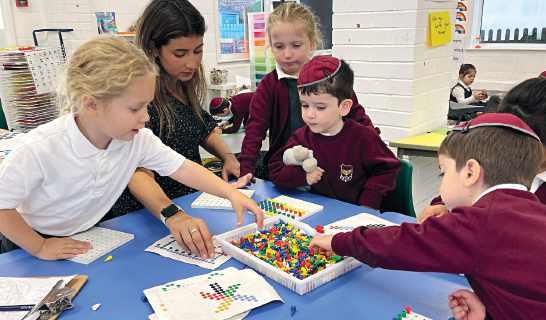
Calling all Prospective Nursery & Reception families
Calling all Prospective Nursery & Reception families
Places available for September 2026
Tuesday 24th September
Limited places available for September 2025
Limited places available for September 2025
We will be holding open mornings at 10 am
Wednesday 30th October, Thursday 14th November
We will be holding open mornings at 10am
Monday 19th May
Tuesday 21st October
Thursday 22nd May
we will be holding open mornings at 10am
Tuesday 28th October
You will have personal tours of our wonderful school, get to meet our Head Teacher and see the school in action. Some spaces are available across the school.If these days are not convenient please call to make an individual appointment.
You will have personal tours of our wonderful school, get to meet our Head Teacher and see the school in action. Some spaces are available across the school.
If these days are not convenient please call to make an individual appointment. email admin@hasmonean-pri.barnet.sch.uk or phone the Office on 020 82027704
To attend, please email admin@hasmonean-pri.barnet.sch.uk or phone the Office on 020 82027704
email office@hasmonean-pri.barnet.sch.uk or phone the Office on 020 8202 7704
Scottish police have arrested three people under the terrorism act after a van draped in the Palestinian flag was rammed into the fence of a company accused of ties to Israel, writes Daniel Sugarman.
A factory of Italian defence firm Leonardo was reportedly targeted by Shut Down Leonardo Edinburgh, a local branch of the wider Shut Down Leonardo UK organisation.
Police confirmed in a statement: “Three women, aged 31, 34 and 42, have been arrested under the Terrorism Act 2000 after a van was driven into an external fence of a business premises in Edinburgh.
“The incident happened during a distur-
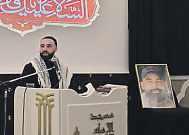
bance in the Crewe Road North area of the city on Tuesday, July 15, 2025. Police Scotland’s Counter Terrorism Unit are leading the investigation and enquiries are ongoing. We are treating this as targeted, and we do not believe there is any wider threat.
“If anyone was on Crewe Road North or in the nearby supermarket car park during the early hours of this morning and has any relevant dashcam footage or saw anything suspicious, please contact the Police on 101 quoting reference 0416 of July 15.”
The arrests come after the official proscription of Palestine Action as a terrorist organisation earlier this month. Among other targets,
Palestine Action members regularly carried out similar attacks against defence sites elsewhere in the UK, cutting off electricity to the Leonardo Edinburgh site in March.
Since its proscription, significant numbers of people have been arrested after expressing public support for the organisation. Last weekend, police arrested 71 people at protests across the UK – in particular in London, Manchester and Cardiff.
The Shut Down Leonardo group is not merely a Palestine Action offshoot, however, with the former having been set up before the latter’s proscription. Shut Down Leonardo Edinburgh managed to close both gates to the local Leon-
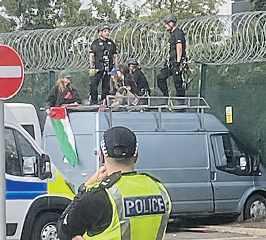
ardo site during a protest in December 2024.
The group claims the Edinburgh site “manufactures components for the F35 Lightning II fighter jets being used by Israel”, specifically parts related to laser targeting. Leonardo UK has repeatedly denied the claims.
There are 20 countries participating in the F-35 programme.
A mosque in north-west London hosted a vigil for a British citizen named in a Hezbollah funeral poster as a fallen fighter, Jewish News can reveal.
Details of the November 2024 event at the Imam Hussain Mosque, Brondesbury, were uncovered by online group The Electronic Uprising, which monitors extremism and terrorism glorification online.
The mosque published a Facebook post announcing a “Condolence and Fatiha council” for Muhammad Jamal Baalbaki, whose death it
described as a loss to “the Lebanese and Islamic community in London”. Photographs from the event show mourners gathering in front of a large projected image of Baalbaki in military-style burial garb, alongside traditional Shi’a iconography.
A funeral poster circulated by Hezbollah around the same time featured Baalbaki’s image and named him as one of eight “mujahideen” killed “on the road to Jerusalem”.
The poster referred to him by a nom de guerre,
• Tax-efficient investing before and after Aliyah
• Tax-efficient income after 10-year tax-free period
• Receive your entire pension pot tax-free
• Specialist portfolio management for Olim
• No Inheritance Tax (for non-UK-situated assets)
We are seasoned experts in providing long-term financial planning advice for those making Aliyah. Scan the QR code to read more
With investing, your capital is at risk. Tax treatments are subject to individual circumstances and are subject to change.
Masir Al-Aziz, a common practice for fighters in terror groups. The design and language closely mirror materials used by Hezbollah’s official funeral department in Lebanon.
Jewish News attempted to contact the mosque for comment but was unable to reach anyone.
Hezbollah is designated in its entirety by the UK government as a terrorist organisation. Under the Terrorism Act 2000, it is a criminal offence to express support for or glorify the group.

by Michelle Rosenberg michelle@jewishnews.co.uk
A Jerusalem-based non-profit set up during the pandemic is helping growing numbers of diaspora Jews to return to Israel, offering tailored support to families from across Europe and Latin America.
Shivat Zion was launched in February 2022 by Dutch-born Shraga Evers and his cofounder Hannah Kaminski. It is the only NGO recognised officially by the Jewish Agency to assist Jews in Europe looking to make aliyah.
Evers was in London this month at an aliyah fair held at Allianz Park in Hendon, where he spoke with British Jews seeking to relocate. Wearing Israel flag head boppers, he stood out
in the crowd – and that, he said, was part of the point. “We want to be visible,” he explained. “We are here to help them before they start to open their file during the aliyah process and afterwards, long after they’ve done it.”
Raised in Amsterdam, Evers moved to Israel at 17 to study at a yeshiva and later served in the IDF. But during his studies he returned to the Netherlands and eventually made aliyah with his wife and eldest daughter.
It was through this experience that he saw how little individualised support existed for those trying to make the move.
“During the coronavirus pandemic, we saw that many people who wanted to make aliyah couldn’t get hold of the Jewish Agency,” he said. “No one was answering phones or emails. We
began helping them as volunteers – taking them step by step through the process and helping with any problems.”
Shivat Zion grew out of that volunteer work and now employs a team of nine. All are former olim themselves. “We know what it’s like,” said Evers.
The organisation supports Jews from the UK, Scandinavia, Switzerland, all EU countries except France, and some former Soviet states. It works alongside Israeli state institutions but fills the gaps they leave.
The NGO recently helped a couple from Italy to deal with a dispute with an Israeli absorption centre and is working with a Ukrainian family living in Moldova, helping with school registration and housing.

The Rabbi Sacks Legacy has appointed leading Jewish educator Jonathan Cannon as its new chief executive, in a major move to expand the global impact of Rabbi Lord Jonathan Sacks’ teachings.
Cannon, who has spent more than 30 years in Jewish education across four continents, will assume the role in mid-August after seven years as head of the Ramaz School in New York City. His appointment coincides with preparations to mark the fifth yahrzeit
of Rabbi Sacks, including the launch of a new Koren Sacks Humash and the annual Global Day of Learning.
Cannon said: “Rabbi Sacks has long been a guiding voice in my life,. It’s a true honour to help carry his legacy forward in this role.”
In a newly created leadership structure, Joanna Benarroch will become president, working in partnership with Cannon to oversee strategic initiatives across North America, the UK, Israel and beyond.
Britain’s oldest Second World War veteran, Donald Rose, has died aged 110. The D-Day veteran, born on Christmas Eve 1914, is believed to have been Britain’s oldest man.
Erewash Borough Council in Derbyshire confirmed the death with council leader James Dawson paying tribute to the “war hero” Desert Rat and adding: “Erewash was privileged to count him as a resident.”
Rose, who was attached to the division that liberated Belsen, joined 45 other guests of
honour in May at a celebration to mark 80 years since VE Day hosted by the Royal British Legion at the National Memorial Arboretum.
He said at the event he did not celebrate the momentous day 80 years ago: “I was in Germany at Belsen and, like most active soldiers, I didn’t get to celebrate at that time.
“We just did what we thought was right and it was a relief when it was over.
“I never believed I would be remembering this day at 110 years old.”

Step into Head Room, Jami’s social enterprise café, supported by The Maurice Wohl Charitable Foundation. It's here, at Head Room, where co ee, conversations and community come together. Also enjoy delicious kosher food and drink, or take part in our unique peer-led community programme, open to everyone.
Relax, meet others or simply soak up the atmosphere. Head Room has so much more to o er than just a great cup of co ee.
There are two diametrically opposed ways of looking at the future of the Middle East, writes Daniel Sugarman.

In one, regional wars continue and escalate, a powder keg that risks igniting a global conflict. In the other, serious steps towards peace and reconciliation allow di erent nations to come together with mutual respect, sharing knowledge and expertise to make the region better for all.
Eli Bar-On, chief executive of MENA 2050 [Middle East, North Africa], clearly believes the second option is not just preferable but possible. The organisation has an ambitious aim; to create a stable and peaceful region through cooperation in a multitude of areas, including climate action, energy transition and food agriculture. It includes representatives from every country in the Middle East and North Africa.
As we meet, Iranian missiles are falling in Tel Aviv. There might be better times to discuss a peaceful future for the Middle East and Bar-On, a former colonel in the IDF, does describe the current situation as “bleak; we’re currently at war, and this war started 20 months now ago”.
He continues: “At the same time, I can say that what happened on 7 October and since basically just showed many people in the region that all the concerns about various extreme groups that were operating in the region were

true all this while, and it’s time to take action against all these groups.”
However, he stresses: “MENA 2050 started as an idea to bring people together from across the region not to focus on the political issues of the region we have. We don’t focus on conflict resolution.
“We have no ambitions to solve conflicts in the region. That’s a politician’s job – but we felt that individuals from across the region have had enough of sitting idle and doing nothing about the future. That they want to work together on nonpolitical issues in order to lead for change.”
He is certainly correct that the MENA area has challenges enough.
“We identified the region is one of the world’s least integrated”, Bar-On says. A side e ect is “we don’t have all the mechanisms to allow us… to look into trends and trajectories of things happening and deal with them as a region.”
A key example is the threat of climate change: “[MENA] is a hot spot”, Bar-On says, noting that climate change is likely to a ect the region more than the rest of the world. “And yet, we don’t have any working group of people from the region saying ‘What do we do about it?’ Climate change doesn’t have borders. How do we deal with that scarcity of water?”
“So, we at MENA 2050 said, let’s bring a group of exceptional individuals from across
the region to create working groups in all these areas that will look into policy issues, but also come up with ideas for great projects that can change reality on the ground and prepare the region for the next generation.”
Bar-On is Israeli, while MENA’s executive committee contains Palestinians, Jordanians and Bahrainis plus representatives from Saudi Arabia, Tunisia, Egypt and Morocco.
The UK board includes Saudi researcher and journalist, Dr Najah Al Otaibe, who says: “I was impressed by the idea of bringing moderate Middle East experts together on one platform to further dialogue and understanding.
“There are few organisations who are wellconnected with home-grown experts from various regions. MENA 2050 has opened up opportunities for many Arab and Israeli analysts and researchers to have conversations with each other. This used to be limited, due to political conflicts and lack of diplomatic relations.”
Bar-On tells me the idea for the initiative came before the Abraham Accords were signed in 2020, but the actual meetings had begun in early 2021 “with a small group of people from di erent countries in the region.
Today, he says, it is a network of hundreds of individuals, from every Arab country as well as Israel, Turkey and Iran.
Did the events of 7 October and Israel’s subsequent response a ect relationships?
No, Bar-On says: “After 7 October, not only has the group not ceased to operate but rather





















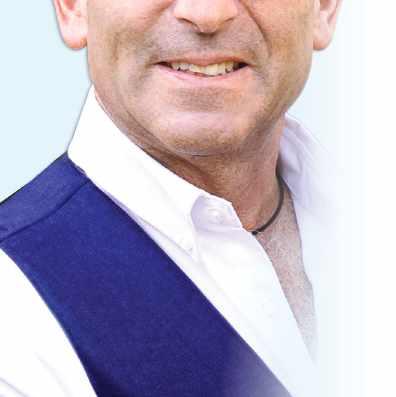



Our dedication to trust , extensive experience , unwavering reliability , and vast professional contacts enable us to offer you a fulfilling and seamless Aliyah experience. We are passionate about helping you make Israel your home, and our mission is to support you every step of the way.
I'm Dov Newmark , and I'm here to help! Be in touch today to learn how I can help make your Aliyah easy !
TO SCHEDULE A FREE IN-PERSON MEETING WITH DOV OR A MEETING OVER ZOOM PLEASE BE IN TOUCH

the number of new members has only accelerated. To me, this proved the concept that people want to put politics aside, and they want to engage with each other and work together towards a better future for everyone.”
As an example of a recent project, Bar-On tells how MENA 2050 has established groups to deal with climate action, water scarcity, food security and energy transition. A few weeks ago, it brought together 40 individuals, including former ministers, scientists, diplomats and businesspeople, to discuss the problems, a group made up of Israelis and Palestinians but also people from Morocco, Egypt, Sudan, Jordan, Tunisia and Bahrain.
“They discussed all sorts of projects we want to promote now, for instance, creating a regional R&D (Research and Development) agency. Currently, you have local agencies,” Bar-ON says.
“Israel, of course, has excelled in R&D… but we said, what happens if we aggregate resources and create a regional agency to do things on a regional level? We could synergise the capabilities of every country… we looked into many different things.
“There’s a wonderful food rescue programme in Israel, and we were discussing a project to use the Israeli experience, the know-how of how to sell food, how to collect food from farmers, from restaurants, from hotels, etc, and use it across the region. I’m very proud.”
Bar-On also discusses MENA’s plan for a Regional Leadership Academy to engage with

young potential leaders in academia, science, journalism and more on AI, climate, healthcare and so on to build a growing group of leaders who are already networked between themselves to push for regional integration and thus “stabilising the region through more regional cooperation, development and integration”.
While the primary aim of MENA 2050 – the date symbolises the possibility of such change succeeding within a generation – is to promote regional integration, Bar-On, as an Israeli whose parents were from Baghdad, also clearly hopes it enables Israelis to build strong relationships with other countries.
“Most Israelis now have roots in the Arab and Muslim world,” he says. “I grew up in a home where Arab culture was very present. My parents were speaking Hebrew to me, but they were speaking Arabic to my grandparents. And my grandparents would speak Arabic to me, would listen to Arabic music, watch Arabic
films. The food was Arabic. This is the story of many other Israelis.”
He points out Israel has a far more diverse population originating from Arab countries than most Arab countries, which is why the image of Israel by some people as a European extension or European enclave is wrong.
“It could be the ultimate bridge state – not only geographically but culturally, technologically, and in many other ways. Israel has a lot to give to the region and a lot to get.”
He has no illusions about the situation in Israel and Gaza, describing Israelis as “traumatised” and Palestinians su ering “grief and sadness”. But for the wider Middle East, he says he is “very encouraged by the messages… from many, many di erent leaders in the region”, who he describes as “pragmatic”.
“I think they’ve been reasonable throughout the conflict,” he says.
“They give me a basis to hope that once the war is over, we will have many pragmatic interlocutors across the region. Also in Washington, you have an American president that has expressed his will to contribute to the peaceful development in the region and has already said he will be working to expand this process of regional integration.
“We are in the depths of sorrow and sadness and despair now, but there are many positive signs we will come out of it. The State of Israel in particular, and the region in general, will be in a much better position in the future.”


Daniel Taub in conversation with Rob Rinder
Monday 8 September, 7pm
In our divisive age, argument is seen as a plague to be avoided or a contest to be won. In his new book, Beyond Dispute, diplomat and peace negotiator Daniel Taub argues that ancient Jewish wisdom offers a third way.

jw3.org.uk /argue-better




Jewish Care at 35 / Special Report
The community’s largest charity has adapted to changing times, but remains firmly rooted in its proud Jewish values
When Jewish Care was born 35 years ago from the merger of the Jewish Welfare Board and the Jewish Blind Society, it marked more than just the joining of two organisations – it marked the beginning of a bold, compassionate response to the evolving needs of the Jewish community.
In the decades since, Jewish Care has grown into the largest health and social care charity for Jewish people in the UK. Today, it supports over 12,000 people every single week – offering not only care, but also comfort, connection and dignity.
Jewish Care has expanded into retirement living, introduced worldleading, culturally specific dementia care, and opened three care and community hubs to support local needs.
Much has changed since those early days. In the 1990s, most people entered care homes at around 81. Now, that age is closer to 90. Shared dormitories have been replaced with private, en-suite rooms.
Its latest project, the Sugar and Ronson Campus in Redbridge – set to open in June 2026 – is being purpose-built to serve the Jewish community of Essex and north-east London now and for generations to come.
But while the services have evolved, the values remain con-
stant. At Jewish Care, Shabbat candles are lit every Friday across care homes and retirement living apartments. Twenty thousand bowls of chicken soup are lovingly prepared each year by the Hospitality team, and volunteers deliver 2,100 Meals on Wheels each month.
From Yiddish conversation groups to festival celebrations, every effort is made to help people stay connected to their Jewish identity, in the way that suits them best.
Though Jewish Care as we know it is 35 years old, its roots stretch back over two centuries through its founding organisations. Today,
alongside backing from UK prime ministers. Public figures and celebrities—Gary Barlow, Dermot O’Leary, Lionel Richie, and more recently Nick Ferrari and Natasha Kaplinsky – have helped mark key milestones. Actor Jason Isaacs, whose father is supported by Jewish Care, also featured in the charity’s moving 35-year anniversary film.
Life President Lord Levy puts it best:“For over three decades, Jewish Care has been a pillar of strength, compassion and community. Jewish Care has adapted, grown and innovated, responding to changing needs while staying true to our core values
MUCH HAS CHANGED SINCE THE EARLY DAYS WHEN MOST PEOPLE ENTERED CARE HOMES AT 81. NOW THAT AGE IS NEARER 90
the charity offers everything from residential and end-of-life care to a dedicated centre for 250 Holocaust survivors, to community centres and mental health services through Jami—now an integral part of Jewish Care.
Royal support has been a constant, with visits from King Charles, Queen Camilla and Prince William,

of kindness, respect, and Jewish identity.
Thanks to the generosity of our wonderful supporters, we will continue to be here for many more years of compassion, connection and community for those who need it most.”
One area of particular pride is Jewish Care’s pioneering approach to dementia care. Over 150 care and hospitality staff have completed the DementiAbility programme, which focuses on helping people living with dementia to maintain independence, dignity and connection.
And it’s not just staff making a difference. Volunteers contribute time and care equivalent to over £9 million annually – a testament to the strength of community spirit.
Yet the challenges ahead are significant. Marcus Sperber, Chair of Jewish Care, outlines the scale of the task:“Over the next decade, the number of people needing dementia and end-of-life care will rise significantly, and more young people and adults are living with mental illness and distress.”

Since Jami joined Jewish Care, its mental health outreach has grown dramatically—from two residential homes to vital community support programmes. With the help of The Exilarch’s Foundation, Jami’s Dangoor Children and Young People’s Service is now reaching 11–18-year-olds in three Jewish secondary schools and the wider community. Four new counselling suites, generously funded by The Wohl Legacy, are offering a lifeline through talking therapies. And the impact is real:
• 62% of Jami clients say they are now better able to cope with life’s challenges
• 10% say Jami has literally saved their lives
• 96% of attendees at Jami education events say they feel better equipped to support themselves or others
“Many of our essential services receive no government funding at all,” adds Sperber.
“With rising inflation, an ageing population, deepening loneliness and a growing mental health crisis, demand is surging, while government support declines.”
The numbers reflect the scale:
• 21,000 enquiries answered each year via the Jewish Care Direct helpline
• 1,200 individual cases supported

by social workers
• 25,000 visits annually to community centres, mostly from older people living alone
• 1,000 befriending calls or visits made monthly by volunteers
All of this—plus specialist dementia care, end-of-life support, and mental health outreach—is only possible thanks to communal generosity and dedicated volunteers.
“This year, we must raise £20 million to continue to provide highquality care and support – today, for our parents and grandparents, and for our children, our community’s future,” says Sperber.
This week the health secretary, Wes Streeting, delivered a fiery speech in which he criticised the General Medical Council for “failing publicly and abysmally in their responsibility to protect Jewish patients”. It is rare to hear a senior minister use such language, but it was entirely justified. The failure appears systemic. The Jewish Medical Association has described bringing antisemitism cases to the GMC. Those not dismissed out of hand are left to languish for months – even years – while those accused continue to practice.
This week Jewish News focused on two cases among many, both involving doctors who rant about “Jewish supremacy”. There has been an open GMC investigation into one for months, with no action taken. The other has just been allowed to return to work, after the Medical Practitioners Tribunal Service appeared to accept her claim that “there was not a single tweet that demonstrates hatred of Jews by virtue of them being Jews”. Action is urgently needed. Jewish medical professionals and patients should not have to work with or be treated by those who appear to loathe them for who they are.
There are just a couple of weeks left to nominate the community’s standout young property professionals as part of the Jewish News’ exclusive 40 Under 40 business lists.
Nominations are open for the JN Property 40 – sponsored by DDRE, Fusion Group and Patron Capital – through our website until Thursday 31st July 2025, a slightly later deadline as requested by some of our judges, who will also be nominating. The expert panel – one of the most accomplished ever assembled by any publication looking at the sector – will then have the task of selecting the 40-strong list to be profiled in Jewish News later this year.
Nominate at: jewishnews.co.uk/40-under-40-propertylist-nomination-form
Sedra: Pinchas

The Board of Deputies has claimed that the punishment meted out on the 36 representatives who had the “bare-faced gall” to use their right to freedom of speech to write a letter to the Financial Times was because “breaches primarily arose from the public presentation and promotion of the letter”.

This, the Board says, created the misleading impression that this was an official document of the Board as a whole.”
Did the 36 send the letter on Board headed notepaper or from a Board email address? Did they say they represented the Board of Depu-
ties? No, no and thrice no. The signatories are very clear that they “write as representatives of the British Jewish community…” Note, not the representatives. There is no room here for interpreting this as the 36 representing the Board, unless the organisation really, really wanted to do so.
Honestly, how the Progressive movement or its constituent synagogues and organisations can remain affiliated to the Board after this episode is a mystery to me.
Joe Millis
By email
Offensive chants broadcast about the Israel Defence Forces elicited an apology from the BBC to the Jewish community, but it remains unclear why would anybody in their right mind refer to the IDF – as MP Diane Abbott did – as the Jewish Defence Force?
David Chesler, Edgware
What is Diane Abbott still doing in the House of Commons? Her continued presence in Westminster shames our nation. Her recent CV is filled with comments and articles that fail to meet even basic standards of behaviour for a public servant.
Sid Hambler, Manchester
Lenin, who I imagine is Comrade Corbyn’s ideological hero, once said historical events repeat themselves twice – first as tragedy, then as farce.
It is this thought from Comrade Lenin – a genocidal figure, like so many other radical left-wing ideologues – that comes to mind when I consider Jeremy Corbyn and Zarah Sultana’s new political project, which recalls the failed Momentum experiment of 2015.
Watching ultra-secular progressive leftists trying to align with ultra-traditional Muslim voters may end up being more entertaining than a Jimmy Carr or Ricky Gervais set (with apologies to both, if they are reading this).
Jeremy Corbyn once famously claimed that British Jews do not understand the British sense of humour. I cannot speak for 300,000 people, but it seems to me that it was not the British sense of humour he believed we failed to grasp, but his own.
David Frencel, Hendon
It is nothing short of shocking that an organisation as esteemed as the Royal Academy of Arts could entertain displaying images equating Israel – and implicitly, Jewish people – with Nazi Germany, including swastikas and references to “genocide”.
One might expect an institution of such repute to exercise rigorous curatorial judgment, particularly when presenting political and religiously sensitive material. Instead, it appears to have abdicated that responsibility, permitting content that traffics in antisemitic tropes – painted as “art” and
Thank you for helping to make Jewish News the leading source of news and opinion for the UK Jewish community. Unlike other Jewish media, we do not charge for content. That won’t change. Because we are charity-owned and free, we rely on advertising to cover our costs. This vital lifeline, which has dropped in recent years, has fallen further due to coronavirus.
Today we’re asking for your invaluable help to continue putting our community first in everything we do. For as little as £5 a month you can help sustain the vital work we do in celebrating and standing up for Jewish life in Britain.
Jewish News holds our community together and keeps us connected. Like a synagogue, it’s where people turn to feel part of something bigger. It also proudly shows the rest of Britain the vibrancy and rich culture of modern Jewish life.
You can make a quick and easy one-off or monthly contribution of £5, £10, £20 or any other sum you’re comfortable with. 100% of your donation will help us continue celebrating our community, in all its dynamic diversity. Support Jewish News by visiting our donor page at jewishnews.co.uk
cynically rationalised as freedom of expression. This is deeply irresponsible.
The Academy’s explanation, citing duty of care toward young audiences, is unconvincing. It should have anticipated the potential harm. Instead, it effectively normalises hate by default, responding only when embarrassed by external pressure.
I urge the Royal Academy to reclaim its role as a guardian of cultural excellence and uphold its duty to respect, not betray, the communities it represents. Hannah Alexander, By email






























BERKOFF OUTGOING UJS PRESIDENT
As I reach the end of my term as president of UJS, I’ve been reflecting on what has truly been a historic, challenging, yet inspiring year. This wasn’t just a year of doing more. It was a year of standing stronger, reaching further, and coming together more than ever before.
We saw more unique Jewish students engaging with UJS programmes and events than at any point in our history. More students signed up to attend UJS’ National Convention and Policy Conference.
More episodes of the Yalla! podcast were recorded and listened to by Jewish students up and down the country. More nonJewish schools were reached, continuing UJS’s unique role as the only organisation providing for Jewish students in non-Jewish schools during their school day.
tours, more panel discussions, more JSoc social events, and more applicants to the Leadership Fellowship.
The list of ‘more’ goes on and on, and it reflects the appetite and energy Jewish students have brought to campus life.
But this year wasn’t just about scale. It was about substance. About innovation. About renewal and reimagination.
We launched a new Sixth Form Leadership Fellowship, empowering future Jewish leaders even before they begin their university studies. We hosted the first-ever UJS Scotland Convention, creating a new space for Jewish students in Scotland to connect and celebrate. We hosted a Shabbaton specifically for Gap Year returnees. We developed a new Israel Educators course to build confidence and understanding around one of the most challenging topics Jewish students navigate today. And, perhaps most poignantly, we opened the UJS 7 October Memorial Garden, a permanent space for remembrance and reflection.
received nearly 2,000 phone calls from Jewish students seeking support. Each call represents a moment of vulnerability, a student reaching for reassurance and strength.
The context for all this activity cannot be ignored. Since 7 October, we have not only seen a sharp rise in antisemitic incidents, but we’ve also felt the chilling shift in atmosphere on too many campuses. I’ve heard directly from students who’ve changed their daily routes across campus, avoided certain spaces, skipped lectures, or felt that expressing their Jewish identity would make them a target.
A campus where Jewish students feel unsafe is a campus that fails all its students. And it’s something we will continue to challenge, vocally and relentlessly.
And yet, in the face of hostility, Jewish students have stood strong. They have stood proud. In leadership and life, we’re often faced with a choice: to dwell in the pain of the past or to build something better for the future.
Jewish life, rather than Jewish strife, continues to define their campus experience.
Over 8,000 Jewish students engaged with UJS this past year. Jewish life, joyful, diverse, and defiant, continues to flourish. Interfaith events have taken place on numerous campuses, demonstrating that collaboration, dialogue, and understanding still have room to grow, even in these challenging times.
Over 5,000 university leaders, sta , and students have now received antisemitism awareness training from UJS, helping to create more informed and supportive campus environments.
Since 7 October, I’ve returned again and again to the words of my predecessor, the late former UJS President Alan Senitt: “More Jewish students doing more Jewish things.”
That is exactly what this year has been.
The Jewish students of today are not just surviving these times. They are defining them. SAMI
Holocaust Memorial Day events drew record numbers. There were more speaker
Our welfare work has never been more vital. Since launching our 24/7 Welfare support line just 19 months ago, UJS has


This year, Jewish students have chosen to live for the future. To build, to lead, and to thrive as a community.
For the vast majority of Jewish students,
This is how history will remember this chapter in campus life, not defined solely by the hatred Jewish students faced, but by the pride they showed in their Judaism.























MICHAEL GOLDSTEIN OUTGOING UNITED SYNAGOGUE PRESIDENT
The United Synagogue is a remarkable charity. If you are Jewish in the UK, whether you’re a member or not, you will benefit from the work of the United Synagogue. When I explain to people from North America or Europe what the United Synagogue is, they are always amazed. The strength of our British Jewish community is, in no small part, because of 155 years of the United Synagogue.
British Jews have experienced so much over the past eight years. Steering the United Synagogue with its 56 communities through the Covid-19 pandemic was undoubtedly among the most challenging situations the charity has faced in more than one and a half centuries.
Working with the Chief Rabbi to close (and re-open) the charity’s places
of worship and ensure ongoing (and changing) guidance was understood and followed remained profound. We have soon forgotten the fundamental change we experienced when Covid set in. Yet, we managed to pivot the charity instantly so that so many of our community were able to stay connected online.
The experience of the days since 7 October also showed the strength of our charity. While many others wavered in their support for Israel, the United Synagogue in all its communities and interactions held firm, and we have seen an uptick in communal engagement as a result. May we soon see the return of the remaining hostages and peace for everyone in the region.
I am particularly proud of the creation of Mill Hill East, a vibrant young community conceived through local initiative. It now has over 450 adult members and 250 children.
The US’s role as the central community function has also been strong. We commemorated the passing of the Queen, the shock of 7 October and the burial of the six Holocaust victims whose remains were
found in the Imperial War Museum.
The foundation of the Jewish Community Academy Trust (JCAT), an ambitious family of four schools which I chair, was also a remarkable achievement. This is now established as a core pillar of community architecture which, I am sure, will grow.
Putting social responsibility at the heart of the work of the United Synagogue is also something I am proud of, supporting the Jewish and wider communities, including establishing two drop-in centres supporting asylum seekers and refugees.
In the past eight years, four communities have joined the United Synagogue, and we have used funds from communities which have closed or merged to buy, redevelop or refurbish 13 community buildings.
Not everything that I have led has been pleasant. I was always taught that you can’t make an omelette without cracking some eggs. Leadership is about making those dicult decisions that have short-term pain but are for the greater good.
I know, in doing some of these things, some people have been upset. I believe it is
To get the best value from your private medical insurance, you should speak to an expert who is qualified to advise you on the right policy for you, and recommend the providers who offer the most competitive premiums.
This advice covers individual, family and company policies, and is always FREE.
As an independent health insurance expert, I work with the healthcare insurers to provide you with the appropriate and most affordable level of cover. So whether you have an existing policy or not, let’s have a chat.
at
3146 3444 or 07956 244350
our duty as leaders to make those calls. Hopefully, we have made the right decisions, but if some weren’t, then I am truly sorry.
It has been an honour to work with the Chief Rabbi over these past eight years. The range of issues which come across his desk and the burden he carries on his shoulders are extraordinary. He leads our community with distinction.
Earlier this month he was able to express in The Sunday Times our collective horror and fear of the events in Glastonbury. I know our members and the wider community are reassured when they see and hear him on television and in newspapers. I have learnt so much from him and treasure our relationship. He does all this, as it says in Pirkei Avot, while receiving everyone with a smile and joy, and he is a true Kiddush Hashem.
It is the rabbinate where I think we have made the most significant changes. We have seen some outstanding rabbinic couples moving into our communities.
The standing of the US as an employer has grown over the last few years, and we must ensure that this is maintained.



VIVIAN WINEMAN TRUSTEE, WINEMAN CHARITABLE FOUNDATION
Shortly after his arrival in this country, my father began to keep a diary. It was written mainly in English, somewhat surprisingly, as it was not his first language, but phrases from other languages did appear. In particular, a famous French proverb, ‘Rien n’arrive ni comme on le craint ni comme on l’espere’. Nothing happens either as you fear or as you hope. Predicting the future is a mug’s game.
During my own lifetime I have seen the fall of the Berlin Wall, the collapse of communism, Brexit, the rise of China, the end of apartheid and the election of Trump (twice). Who would have predicted any of these events?
The phenomenon closest to me personally, however, has been the survival, in fact the resurgence, of Orthodox Judaism. When I grew up as a teenager in the early years after the Holocaust, no one gave it much of a chance.
The one third of the world’s Jews who were wiped out in the Holocaust contained the vast majority of its Orthodox Jews and almost all its yeshivot (religious academies).
It was predicted that secularisation and assimilation would finish off the process. In 1948 a member of the Knesset of Yemenite descent predicted that in a generation no Yemenite Jew would even know how to lay tefillin (phylacteries) let alone be inclined to do so. In 1948 Ben Gurion, predicting that the yeshivot were on their last legs, was prepared to agree that their students should be exempt from army service. At the time, the number of people covered by this exemption was 450.
Such predictions have turned out to be wide of the mark. The number of students in Yeshivot claiming exemption from army service in 2023 was 65,000. In Israel alone, strictlyOrthodox Jews, or Haredim as they prefer to be called, now number more than 1.3 million, or 14 percent of the total Jewish population.
Their share of the overall population is only expected to grow. With numbers comes power. The current Israeli government is completely in hock to them. Whilst the exemption from
army service is deeply unpopular with the Israeli public, the chances of its being abolished in the near future are very remote.
The obvious explanation for this growth is demography. A Haredi woman will have, on average, six to seven children. Her secular sister will have two to three. The total Haredi population is growing at the rate of between three percent and four percent per annum, which means it will double every 18 to 24 years.
But high birth rates are not the whole story. Equally significant are the high retention rates with regard to the younger generation and, to a lesser degree, the number of secular Jews becoming religious in the baal teshuvah movement. Whereas one hundred years ago children born in Haredi homes were turning to socialism, secular Zionism or just assimilating, now the vast majority are adhering to the ways of their parents or even becoming stricter.
In part this is the result of greater prosperity. There is no longer the same pressure to find economically viable employment – Jews do not need to break Shabbat to do so. In part it is due to the greater respect in which Jews are held in the community generally and to the decrease in
institutional antisemitism.
The minor public school I went to add a quota on the admission of Jewish boys and was quite unapologetic about it. The high master of St Paul’s, defending his quota in an interview with a national newspaper, said that if they admitted all eligible Jewish boys, they would be ’overrun’. No headmaster would dare make such a statement today. Even Eton has a sizeable Jewish contingent. The provost proudly showed me the treasures of its library of Judaica and explained that they had a Jewish chaplain to look after Jewish pupils.
Medical schools and law firms, once closed to Jews, now have them in the highest positions. Jews no longer feel the need to anglicise their names or to abandon traditional clothing. Children of mixed marriages frequently identify as Jewish. Before World War II, they almost never did. The increased self-respect that Jews can feel now has a ripple effect on the Haredim. With communal role models all around them, they are no longer incentivised to drop their Jewishness.
As my father’s French proverb implies, history moves in complicated ways.



CLAUDIA MENDOZA CHIEF EXECUTIVE, JEWISH LEADERSHIP COUNCIL
Last week, the Intelligence and Security Committee of Parliament (ISC) published its report on Iran, confirming what we have long-known to be true: the Iranian regime actively targets Jews and Israelis on UK soil. Iran views our country as collateral in its handling of so-called enemies of the regime. Indeed, report asserts that the threat of physical attacks on individuals in the UK by Iran is now at its greatest level and is comparable with the dangers posed by Russia and China.
The report reveals that since 2022, Iran has attempted at least 15 assassination or kidnapping operations against individuals based in the UK.
In October last year, MI5 confirmed that they had responded to 20 Iran-backed plots presenting potentially lethal threats. And just last month, three Iranian nationals were charged under the National Security Act, prompting the foreign secretary to summon Iran’s ambassador.
This cannot continue.
I fully endorse the ISC’s call on the government to make it unequivocally clear to Tehran that any attack on Jews or Israelis in the UK would be treated as a direct attack against the UK.
It is also abundantly clear that the Islamic Revolutionary Guard Corps must be proscribed as a terrorist organisation. If this is not possible through existing legislation, the government must create a new power of proscription to cover state threats.
This report should not only mark a turning point in UK government policy, but it should also serve as a vindication of those who have long sounded the alarm, including successive Israeli governments.
In the weeks leading up to Operation Rising Lion, Israel’s pre-emptive strike against Iranian military and nuclear facili-
ties, many in Britain, Europe and the United States had become increasingly critical of how Israel was prosecuting its war against Hamas in Gaza.
There had been no shortage of uninformed actors weaponising international law to table absurd and offensive accusations against the world’s only Jewish state.
The atrocities of 7 October and the plight of the 50 innocent Israelis still being held hostage in Gaza have been conveniently forgotten by those who hate Israel.
Let’s be very clear, Hamas, funded and armed by Iran, started this war.
And Iran, emboldened by Western appeasement, meant to finish it.
Iran does not hide its ambitions. Ayatollah Khamenei has called Israel a “cancerous tumour” that must be “eradicated.” And last year, in April and October,
Iran’s capability and willingness to target Israel directly became clear, as the IRGC directly fired hundreds of missiles at Israel.
Israel has also repeatedly warned Iran and the international community that it would not stand idly by in the face of the existential threat posed by Iran’s nuclear programme.
Those warnings were ignored. By the time the IAEA declared that Iran was not complying with its Nuclear Non-Proliferation Treaty obligations, Tehran had already amassed a stockpile of over 400kg of 60% highly enriched uranium.
This was enough material to build at least nine nuclear weapons.
The same regime is also supplying weapons to Russia in Ukraine. This is not a distant war; it is a global fight against tyranny, terrorism, and the ideologies that fuel them.
For those who claim to care about peace and human rights, now is the time to recognise reality.
The world’s most dangerous regime was on the verge of obtaining the world’s most dangerous weapon.
Israel stopped it. All of us in the West should be grateful.
A look
Tim Franks Rolling Stones What to see at the Fringe
Ben Rappaport is playing a non-Jew in a show about a Jew. But it works, he tells Anthea Gerrie
For the second time in a row the Barbican is hosting an acclaimed Jewish play - but in this case the Jewish co-star of a drama showcasing one of Hollywood’s greatest Jewish celebrities is not playing the title role.
Instead, Ben Rappaport is reprising his Broadway star turn in Good Night Oscar as Jack Parr, the WASPy talk show host famous for his nightly sign-off tribute to his favourite guest: “Good Night Oscar Levant, wherever you are.”
While the title role of Levant, the notorious Jewish wise-cracking virtuoso pianist, is played by Sean Hayes of Will & Grace, who won a Tony for his New York performance, Rappaport is joining him in London to play the gentile talk show host who championed Levant, a troubled 20th century genius who was the first celebrity to air his mental health problems in public.
“Oscar was a coveted guest on chat programmes because he was so thrillingly unpredictable,” says 39-year-old Rappaport, who drew on his own family history for the role of Paar, a pioneer in putting risky guests in front of live television cameras.
“My mother was born Catholic, but converted before I was born, so I had that side to draw from as well as the Jewish heritage which made playing Perchik in Fiddler on the Roof ten years ago (coincidentally Fiddler was the previous show at the Barbican) such a personal experience for me.”
For that 2015 Broadway revival, he says he did “a lot of research into my father’s family, who came over to the States from Minsk and other places in the Pale of Settlement. I found so many parallels with Tevye’s Anatevka,” adds the New Yorker, who has had trouble tracking down the Ashkenazi comfort food so much easier to find at home: “I’ve been asking everyone in London where I can get decent bagels and a good corned beef sandwich!”
It’s only the second visit to the UK in 18 years for Rappaport, who has ancestors in Norwich but grew up in Houston, Texas, where he went to Hebrew school and was barmitzvahed. A prize-winning student at New York’s prestigious Juilliard drama school, he has won over audiences on screen as well as the stage with recurring roles in the long-running dramas Ozark and The Good Wife.
The actor believes Jewish angst, as portrayed in Good Night Oscar by Levant’s rampant OCD, is endemic: “I think the Jewish community carries a lot of generational trauma - it’s part of our DNA” - and that the
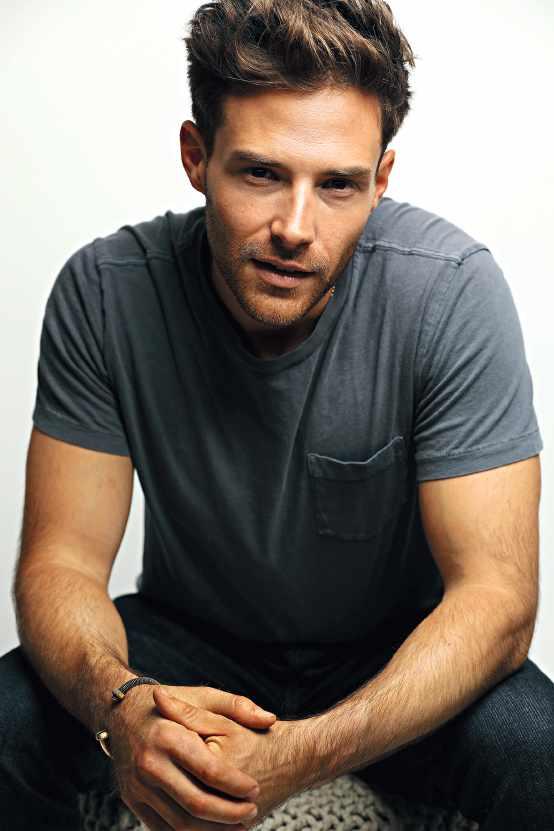
pioneer among chat show hosts because he wouldn’t prepare his questions - he was subversive, using the ‘aw shucks’ demeanour which endeared him to his audience as a cover. He presented himself as palatable to the American public and network chiefs, but his other foot was in the subversive camp with Oscar. I believe that Jack saw a bit of
night or not, says Pulitzer-winning playwright Doug Wright. He based Good Night Oscar on real-life incidents, including the fact that Levant, who was committed more than once, got a four-hour leave of absence from a psychiatric hospital to appear on TV.
Art follows real life in Wright’s depiction of Levant’s hallucinations in the form of the

ghostly presence of arguably the world’s most famous Jewish composer, George Gershwin. “Levant was so obsessed with Gershwin I just had to include him in a screenplay I was commissioned to write by Steven Spielberg,” says Wright, who admits to sharing an obsession with Levant with Hayes, who fought to bring Oscar to the stage since being cast to play him in Spielberg’s ultimately undeveloped project. “Happily, Steven signed as a producer of our New York stage production, so it has been a nice little confluence of circumstances.”
Rappaport and his actress wife Megan, whose mother is Jewish, will likely spend Rosh Hashanah in London, as the Barbican run of Good Night Oscar finishes the day before. But they will be back in New York before Yom Kippur, where it has been a couple of years since Rappaport celebrated the high holidays in shul as he did growing up: “I am a cultural Jew and I love that the city which is my home now is such a centre of Jewish culture, the original landing spot for not only my own family, but so many other Jewish emigrants over the years.”
Fans of Rappaport’s hunky good looks, slightly diluted as an over-Brylcreem’d Paar, can enjoy him au naturel on the silver screen once again this year - he has a leading role in Grosse Pointe Garden Society, streaming now on Peacock and Amazon, as a suburban gardening club member caught up with others in a blend of murder and mischief.
Levant, who frequently made wisecracks about fellow Jewish celebrities - “I think a lot of Leonard Bernstein, but not as much as he does” and “Now that Marilyn Monroe is kosher, Arthur Miller can eat her” are two of the most famous - no doubt would have a joke of his own about Rappaport’s unlikely casting.
• Good Night Oscar is at the Barbican July 31 - September 21 2025. barbican.org
BBC journalist Tim Franks’ new book charts the challenge of juggling his job with his Judaism. By Charlotte Henry
Tim Franks arrives for our interview apologising profusely. He is three minutes late. This rather reveals the intensity and precision of a man who now presents Newshour, the flagship show on the BBC World Service, after decades in various foreign postings, notably the Middle East.
It was that role that saw the central themes of his book The Lines We Draw – Judaism and journalism – collide
The occasional conflicts between the two key factors in Franks’ life are clear from the outset. The author recalls undertaking hostile environment training at the BBC during which the trainer advises the group that should they be taken hostage by Islamists they should say they believe in God and be specific about which faith they are part of.
“I’m Jewish.” Franks tells her. “Ah. That’s di erent,” came the reply.
Indeed it is. And being di erent was something a young Tim Franks had to get used to. He grew up not in the heart of bustling Jewish life

in north-west London, or even in Manchester or Glasgow, but in the tiny community in Birmingham. “There was quite a lot of antisemitism when I was growing up and you sort of kept yourself to yourself,” Franks tells Jewish News.
The journalist and author writes about his family as something of a self-contained unit. None of his grandparents were alive as he grew up “so it was di cult to sort of trace the lines”.
A combination of this and journalistic instinct prompted Franks to
go back and put together a family tree that begins in not Russia, as he had expected, but in the 1700s in Spain and Constantinople. (There are links to Bevis Marks Synagogue in London too.) The discoveries were “revelatory. It was fascinating,” he says, with the kind of enthusiasm journalists reserve for landing a big scoop.
Not being aware of his family history, nor having these direct links to the past, did not disconnect Franks from his Judaism. He is a regular at shul who says that “Judaism has been phenomenally important to me”. Indeed, he reveals that early on in his BBC career he declined to go to a drinks event for trainees, going to shul for the Rosh Hashanah evening service instead, despite being warned that his absence would be noticed.
His connection to his religion and culture is clear, but writing “deepened my sense” of being part of a wider story, he says.

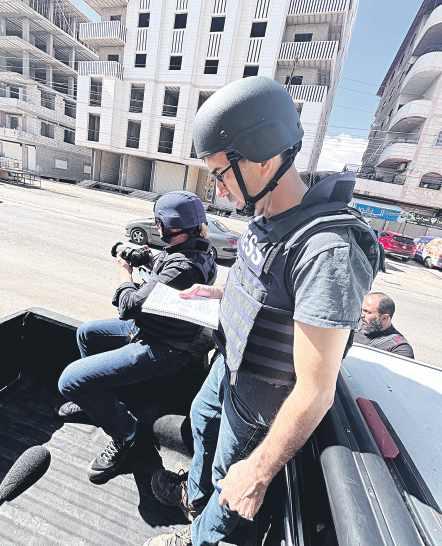
Instead, the presenter says he does not believe that there is an anti-Israel bias at the corporation and insists he wouldn’t remain there if he did. Unsurprisingly, Franks also declines to criticise colleagues such as Jeremy Bowen, whose reporting on the Gaza war has provoked criticism from many in the community. Whether this is all sincere or Stockholm Syndrome is hard to tell.
colleagues such as Jeremy Bowen, many in the community. Whether ions at the door when they arrive
Franks’ book is all about using that story to tie together his life as a Jew and his life as a journalist. “I think the reason that I was drawn to journalism in the first place… was partly because of the family in which I grew up and the parents that I had, and partly growing up as a as a practising Jew in an in an absolutely minuscule Jewish community,” he reflects Franks, as one might expect from a highly accomplished broadcaster, is a lucid and engaging person to have a conversation with, although it is clear he is not that comfortable being the interview subject and occasionally shifts into interview mode during our conversation. He is loquacious and remains so even when challenged about the BBC’s alleged bias against Israel, declining to shut the topic down.
that I work with also understand
While Franks acknowledges that nobody can leave their opinions at the door when they arrive for their shift at Broadcasting House, he believes “most people that I work with also understand that there is a job to do. He adds:
“I’m not an automaton in terms of Gaza. It’s a phenomenally di cult story to tell… It is Ground Zero of that old thing about competing narratives. But our job is to ask the questions and to try and cut through as much of that as possible.”
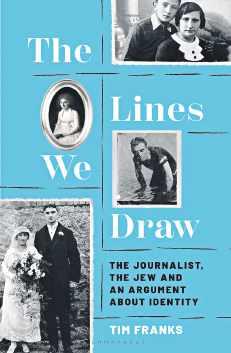
terms of Gaza. It’s a phenomenally semitism, Israel’s

war with Iran or something else -that gives you some semblance of control that others do not have.
The “just asking questions” defence is unlikely to dampen the fury felt by vast sections of the Jewish Community who, post 7 October, feel the BBC’s coverage of Israel has veered between frustrating and outright dangerous.
So how has the last 21 months been for him as a Jewish journalist? For many of us, it has been exhausting. Franks is more positive. “At least I get to ask questions,” he says. “I think a lot of the arguing that people feel inside and outside the Jewish community is there’s that sort of sense of a complete lack of agency.”
There is undoubtedly something about covering a di cult issue that personally a ects you as a journalist – whether it is anti-
Perhaps this is why Tim Franks was so keen to write a book that conslidated both his identity and his family’s history. It gave him a sense of control over his story, something that has not always been possible.
“It was just a fact of being Jewish… especially a Jewish journalist who deals with the Middle East. Lots and lots of people have very strong ideas about what that means both inside the Jewish community and outside the Jewish community. For good, for ill. Whether they think it’s a sort of physical impossibility for me to be a Jew and a journalist.”
Far from being impossible, it makes for the basis of a fascinating story.

Highly Qualified GMC Registered Consultant Child & Adult Psychiatrists
CQC Rated Good in all 5 categories
Shared Care & Liaison With Family Doctor

Comprehensive assessments & treatment for wide range of mental health conditions.
Direct liaison with GPs, employers, universities, schools, and the DWP to support your needs.
Access to effective, tailored treatment plans to help you manage and recover.
In-house psychotherapy with experienced professionals for consistent, ongoing care.





•
•
•

















A collection of Rolling Stones photos that are undisputed rock history have gone on show in London
By Jenni Frazer
One of Gus Coral’s children casually asked him what he was going to do with the photographs sitting, untouched and unexplored for decades, under his bed.
As Coral admits today, the pictures were not just “a closely guarded secret” but a little piece of rock history – the first photographs taken of the Rolling Stones in their earliest days, snapped with trademark chutzpah by Coral in 1963.
Mick Jagger was just 20 and the rest of the band around the same age, except for Bill Wyman, then a “venerable” 26-year-old. Coral was also 26.
Now 100 pictures taken by Coral have been dusted off and put on display at London’s Dockside Vaults at St Katharine Docks, in a show due to run until 10 September.
The pictures are not so much rock history as rock archaeology.
Coral snapped the Stones when they weren’t even top of the bill but a support act for a tour with headliners the Everly Brothers and Bo Diddley.
If that’s hard to credit, even more entertaining is one shot taken on a pavement as the five band members

scraped together the money for a taxi fare. To anyone familiar with stories of the Stones’ later rock ’n’ roll excess, it doesn’t seem possible that Jagger and co would ever have been that short of cash.
How did Coral, now 86 and living in Camden Town, come to take the extraordinary photographs? He is part of a British Jewish family betting dynasty — Joe Coral was his uncle and his father, Eric, was also a bookmaker. Among his possessions is “a picture of my father in my grandmother’s arms, taken by a Moscow photographer”. He believes his family lived in a mining town in south Poland before coming to London.
“There were three of us who met at Cambridge University”, Coral explains. “There was James Miller, Dick Fontaine, and me. I went to study architecture — but they threw me out for being a ‘bad boy’.”
Probably he wasn’t as badly behaved as all that, he says: “But I had done two years of National Service in the army and being at Cambridge [and subject to new restrictions] felt a bit like going back to school again.”
But he and Miller — who was also


studying architecture and graphic design, and Fontaine, who became an admired documentary film-maker — became fast friends.
“We had all seen the Stones,” Coral says. “We were working together in a sort of loose way. I was a photographer and had made a couple of films while I was at Cambridge. Richard was working for a small TV company and he was asked to say who was going to be the next big band. We all agreed it was going to be the Rolling Stones.”
Laughing, he adds: “We didn’t know how big! We’d all been to see them play in Richmond: we were all jazz fans and we’d got into jazz via the blues, and at that time the Stones were a blues band”.
When they heard the Stones were doing their first tour, the friends checked the dates and decided to go and see them. “I had a car, and Cardiff didn’t seem too difficult to get to.”
So Coral, Miller and Fontaine arrived at the Cardiff theatre where the Stones were due to play. “They weren’t there but someone said they were at the cafe round the corner. We went there and said we’d like to take some photographs.”
More than 60 years after this encounter, Gus Coral doesn’t remember any difficult response from the band. “I think they had been
recording in a few days and would I like to go and photograph it?”.
That recording became one of the Stones’ first big hits, I Wanna Be Your Man, written by Lennon and McCartney. Released in November 1963, it features driving guitars by Brian Jones and Bill Wyman and probably the earliest appearance of the pouting, teasing Jagger on vocals. Coral’s photographic philosophy, he says, was “to take pictures of people that I thought were going to be pretty significant in the future. Obviously I didn’t know how significant or how long they would

forewarned. In any case, there was no problem, it was never even suggested. I could go anywhere, there were no other photographers. It was the perfect gig in that sense.”
Coral took as many pictures as he could, all ‘fly-on-the-wall’ and not posed. He is keen to emphasise they were “well-behaved” and “they really weren’t ‘yer rock musicians’ at that time. They were musicians and they had spent a lot of time practising; they were serious about their work.”
He doesn’t remember how the Stones reacted to his pictures, but they must have been happy because “they told me they were doing a
last — but I knew they were special.” Initially, he says, the plan was for Fontaine to make a film about the Stones. “But that never happened, so I just tucked the pictures away.”
After a long career as a freelance photographer and occasional filmmaker, Coral is proud of his Stones pictures: “I think they’re rather better than I could do today. It’s to do with youth, agility and access.”
• Gus Coral’s rare 1963 pictures of the Rolling Stones are on show until 10 September at the Dockside Vaults in St Katharine Docks, entry £15. docksidevaults.com

A host of Jewish performers are heading to Edinburgh Fringe and if you are too here’s our pick of what to see. By Louisa Walters
Meg & Marge
Meg, a picture-perfect tradwife with thousands of followers, is haunted by the restless spirit of 15th-century mystic Margery of Kempe. As their worlds collide, Meg’s flawless façade shatters. Written and performed by Cosima Gardey and Fiona Tarses, this darkly comic show explores the dangerous allure of performative perfection, from medieval confessions to TikTok trends. ZOO Playground 1 1 - 25 August at 3.15pm.
Excel Comedy and Mathem-antics
Stand-up comedy for spreadsheet experts and casual users alike, performed by a true piece of sheet. Sprinkled among the jokes you’ll learn a few Excel tricks from punloving Excel YouTuber and Jewish math addict David Benaim, who advises Microsoft on future directions for Excel.
The Caves 31 July - 24 August except 2, 9, 12, 16, 23 at 1.30pm

The Poetess
From director Laura Wohlwend comes The Poetess, blending storytelling, poetry and audience interaction. The show follows Viola, a modern-day poet finding purpose through writing poems for strangers.

Inspired by real requests, the play explores grief, womanhood and queer friendship. Each performance ends with a poem gifted to every audience member — to pass on to someone else. Pleasance Dome 30 July – 25 August at 11.55am
The Strongest Girl in the World Truly Siskind-Weiss wrote and performs in this bittersweet solo comedy about a girl’s attempt to stay strong after the death of her father. Set to summer-camp songs and storytelling magic, it unpacks grief with warmth, wit and Girl Guide badges. Weiss brings a cast of vivid characters and memories to life in a love letter to her dad.
Gilded Balloon Patter House (The Snug) 30 July – Monday 25 August (not 12/19) at 2.20pm

Nice Try
As she packs up her childhood bedroom Lily Blumkin introduces
us to nine zany characters including a well-meaning dad, a self-indulgent rabbi and an inanimate clump of hair. Nice Try presents an honest look at how we use the past to make sense of our present. Gilded Balloon Patter House (Blether) 1 – 25 August (not 14) at 5.40pm

Millwall Jew / I Should Have Listened to Ivor Dembina
Comedian Ivor Dembina presents two hilarious shows including his bitingly funny account of why he now supports south London’s most notorious football club, Millwall FC. Laughing Horse @ Bar50 (Venue 151) 31 July - 24 August (not Tuesdays) at 2.15pm and 6pm

Life Lessons from a Jewish Grandfather (Zaida) Liverpool-born comedian Henry Churniavsky’s solo show is about how he brought up twins (with a little bit of help from the wife) and now he is bringing his life lessons to his grandson. His parenting skills may still be valid, but his daughter thinks differently. Learn how a sexagenarian deals with eating out, social media, lockdown, old age and his medical procedures.
The Space @ Surgeons Hall (53) 18 – 23 August at 7pm
I Wish My Life Were Like A Musical Composer/lyricist Alexander S. Bermange’s comedic musical revue reveals everything you could want to know about being a musical theatre performer plus the devotees, detrac-

tors and disruptors they perform to, lifting the lid on awful auditions, debilitating dance routines, midperformance mishaps, backstage backstabbings and those magical moments that make it all worthwhile. Auditorium at Gilded Balloon 31 July - 24 August (not Wednesdays) at 5.45pm

Niusia
Niusia was a Holocaust survivor, and 80 years on from the liberation of Auschwitz there are nearly no survivors of the Holocaust left. Through this performance, her grandaughter Beth weaves together memories, handed-down stories and interviews to examine the precarity of identity, and the haphazard cultural legacy secondthird- and fourth-generation immigrants are handed.
Summerhall 31 July – 25 August (not 11 and 18) at 1.20pm.
PSA: Pelvic Service Announcement
When know-it-all NYC comedian Amy Veltman seeks help for diffuse midsection issues, she quickly learns how little she knows about
her body’s most basic functions – in spite of her OB/ GYN father. She shares it all in this extravaganza featuring unhinged characters, music, videos and a medically unsanctioned chart. The Space @ Surgeons Hall – Haldane 1-16 Aug at 10:50am (no show 10 Aug); 18-23 August at 11.50am
Tall Girl Energy
It’s hard to smash the glass ceiling when you can’t reach it, but Leslie
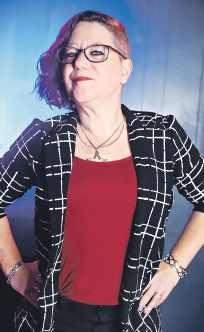

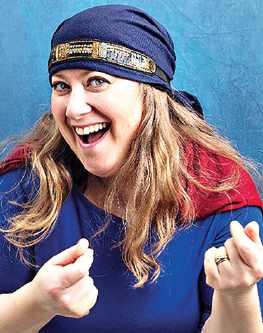

rach to Dylan. The Drawing Room Assembly Rooms 31 July – 17 August at 6.35pm
Accordion Ryan’s Pop Bangers
Britain’s Got Talent star Accordion Ryan will sing and play your favourite songs like you’ve never heard them before plus a few of his own hilarious tunes.
Don’t Panic!
Gold takes a leap at the challenges of being a small woman in a world built for the average man. The result is a funny, thoughtful show, finding laughs in surprising placesincluding the ladies’ loo. Counting House Attic 31 July - 24 August (not Tuesdays) at 1.30pm
LOLyamorous Sick of swiping?
James Regal’s unpredictable night of on-stage speed dating. Put your name down for the chance to enjoy a one-minute date on stage with a mystery match from the audience (or just watch from the crowd). Regal also has a solo show called People Pleaser Coco Boho 1 - 25 August (not Mondays) at 7.45pm and The Snug at Bar 50 at 12pm
9/11 Birds and the Bees
Where were you on 9/11? Sofia May was running from the dust and debris as the World Trade Centre toppled next to her school in Manhattan. As an adult, she’s processed the trauma, in this stand-up show she takes the audience on a comedic journey of her experience as a tween survivor of 9/11. West Port Oracle Flight Club 31 July – 24 August (not Tuesdays) at 7.30pm
Jeremy Sassoon’s MOJO (Unplugged)
Singer pianist Jeremy’s MOJO (Musicians Of Jewish Origin) is a barnstorming celebration of the most iconic Jewish popular songwriters, from Gershwin to Winehouse and Bacha-
Over the years, there have been challenging moments for some Jewish performers at the Fringe. I’ve had my posters defaced with swastikas, been booed when introduced as a Jewish comedian, and had audience members challenge me about Israel/Palestine in the middle of a comedy panel show. I’ve also received kindness and care from peers, venue staff, and the festival team I perform with, the PBH Free Fringe.
A few years ago, amid the rise in antisemitism, I set up a support group for Jewish artists at the Fringe, regardless of religious observance or political affiliation. It is now officially recognised by the Edinburgh Fringe Artist Services Department and has immense support from CST and Police Scotland. We’ve have been offered safe spaces and the open arms of the Edinburgh Hebrew Congregation

Balloon at Appleton Tower (Eve) 30 July - 24 August (not 6, 12, 19) at 10.20pm
Kate Pinchuck’s parents are psychologists and for her mental illness isn’t a buzzword – it’s a way of life. She’s trying to get better but fixing yourself is hard when being unwell is kind of your thing. Pinchuck’s obsession with fixing herself spills over into trying to solve her audience’s problems too. ADHD? BPD? OCD? She’ll help you catch ‘em all! Brass Monkey: The Games Room 31 July - 24 August at 12.45pm


Never underestimate the power of a lesbian in love. Jessica Toltzis plays Edie, a woman inspired by the fabulous life of Edith Windsor and her sexy and tumultuous relationship with Thea Spyer. Edie sues the United States of America and convinces the Supreme Court to recognise the love that she and Spyer share, changing the very definition of marriage. The Annexe at Paradise in The Vault (Venue 29) 1 - 16 August (not 9) at 9.10pm
Tickets for all shows at edfringe.com
and Chabad of Edinburgh, both of whom welcome visitors for meals.
Since 7 October, virtually every Jewish performer I know has witnessed antisemitism in the industry and in recent months the situation has escalated. I’ve seen threads on social media targeting Jewish performers and warning them that Zionists are not welcome, that they should beware of setting foot in Edinburgh.
I’ve asked other Jewish performers what’s made them choose to stick their heads above the parapet there this summer, and they’ve almost all responded that they are driven by Jewish pride.
My own show, Ultimate Jewish Mother, is back because, for me, performing this show has become a form of activism. I stand there proudly in my Jewish skin, wearing
identifiably Jewish clothing and symbols, loving my heritage and loving the audience who’ve chosen to spend an hour with me. It ends with a call for peace and the release of the hostages. It’s been nominated for awards and had some lovely press, but the most meaningful feedback has been from non-Jewish audience members saying that I reminded them of their mums, and how more unites us than divides us.
At this year’s festival, there are around 50 shows written and/or performed by Jews, across theatre, comedy and music. We’ll make you laugh, we’ll make you cry, and we’ll remind you that we are your community too.
Ultimate Jewish Mother is at Whistlebinkies 3 - 24 August (not Saturdays) at 1.30pm
In our thought-provoking series, rabbis, rebbetzins and educators relate the week’s parsha to the way we live today
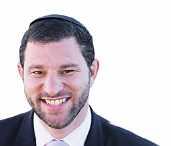
BY RABBI STEVEN DANSKY CRANBROOK SYNANGOGUE
Moving forward despite our trauma
Last week my congregation, Cranbrook Synagogue in Ilford, held an exhibition entitled Eternal Embrace. This exhibition, created by Ifat Peer, presented photographs and texts of mothers who lost children on and directly after 7 October. The mothers described their love for their children, and the heartbreak that they experienced when hearing the terrible news.
The exhibition was held over a few days, including Shabbat. One of my congregants asked me whether it was permitted to show such a sad exhibition on Shabbat, which should be a day of joy. The Halachah requires mourners to set aside their mourning on a public level on
Shabbat by wearing smart clothes. It is a day in which we sing that “sadness and sighing should disappear”. Should we, I was asked, invite others to see such a heartbreaking exhibit on this day?
There is no doubt that the photographs and texts were heart-rending. No parent should ever have to lose a child. Yet, there was also something poignant and beautiful.
Without exception, the mothers all mentioned that they established charities or initiatives, whether it was the writing of a new Torah scroll or opportunities to study music, as a way of memorialising their loved ones.
In this week’s parsha, Pinchas, we read about trauma and comfort. One of the elements that the Jewish people both in the diaspora and in Israel need after 7 October is comfort.
Without feeling comforted, we are tethered to the past, without being able to move into the future. At the same time, moving into the future can be perceived by some as a betrayal to the memory of those who have
been lost. That leaves us in a double-bind –being unable to move forward and unable to stay within trauma and pain.
Judaism provides a nuanced approach to this double-bind. We don’t let go of the past. We take every painful memory and we convert it into something positive and constructive in the future. When a loved one passes away, the words of our prayers are clear: “It is forbidden for us to forget our memories”. We take the memories of all those loving moments and use them as a spur for positive relationships with each other and with God in the future.
This is not an easy task, but with God’s help it can be achieved. We tell mourners: “May the place (God) provide you with comfort”. God is referred to as the “place” because he contains the entire world. In psychological terms a container is someone who ‘contains others’ –who helps manage those di cult feelings.
A container doesn’t just listen; he or she emotionally holds what you’re feeling, making it



feel safer and more manageable. We ask God to be that container for the bereaved, allowing the bereaved to feel safe after the sadness.
The stories of these mothers were emotionally wrenching, but at the same time they were – and are – redemptive.
They show us the nature of healing and growth. They instruct us how to move forward in our lives when every instinct within us wants to stay in a traumatised past. This lesson should be taught on any day – even on Shabbat.
It is the key to all Jews moving confidently into a future, taking the pain of the past, and transforming it into a structure of care and love.

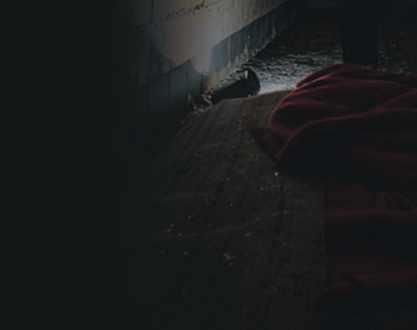






BY RABBI MARK GOLDSMITH SENIOR RABBI OF EDGWARE AND HENDON REFORM SYNAGOGUE
Britain remains a good place to be a Jew. Our synagogues are active and inviting, our cultural organisations are thriving, our community is able to go about its daily life at all levels of observance unhindered and we have the protection of the law through the Equality Act 2010. Jews are thoroughly involved in all aspects of the nation’s economy, services and government.
But there is undoubtedly a worse atmosphere of antisemitism right now than at any time I have experienced since the days of the National Front in the late 1970s.
A parent in our community was harassed by two boys shouting “Heil Hitler” as she left our synagogue building with her children a
couple of weeks ago. A young woman at a local mainstream secondary school was subject to nasty antisemitic bullying a month ago, for which, despite repeated contacts from her parent and our synagogue, the school has still not followed through on its promised programme to address the o enders.
A parent in our nursery has requested we do not detail the Jewish education of their child in their application to a local primary out of the fear, hopefully and almost certainly unfounded, that the school might discriminate against a Jew.
The atmosphere of unsafety in the UK is of course stoked further by the incitement to violence broadcast publicly from Glastonbury. Bob Vylan’s illegal chant calling for the death of all members of Israel’s army is completely unacceptable, whatever he may think of the Israeli government’s actions in Gaza, as it would have been had he chanted for the death of the Russian army were he to have opposed the invasion of Ukraine.
The use in a rapidly-deleted tweet by Diane

Abbott MP of the false title ‘Jewish Defence Force’ for ‘Israel Defence Force’, accusing Israel’s army of genocide, was rightly decried by fellow Labour MP David Taylor who said: “Language like this fans the flames of anti-

Chana has a great opportunity for a welcoming coordinator to work early evenings to coordinate our therapy and event hire spaces. Working with Chana’s marketing team to promote the Kasner Centre and improve sales, you will also be responsible for setting up and coordination of events.
please send your CV and cover letter to ari@chana.org.uk and if you have any questions, please email or ring us on 02082038455
A stimulating series where our progressive rabbis consider Judaism in the face of 21stcentury issues
semitism and puts Jewish communities in the UK at risk.”
Some of the experiences of our community are of old tropes of antisemitism. Some are based on the idea that condemning Zionism is fair game for someone who otherwise does not consider themselves to be antisemitic.
But when a rapper calls for death to the IDF, he means that my cousin Yossi, an IDF paramedic in his early 20s, should be killed. When we hear chants that a Palestinian state should extend “from the river to the sea” we hear that our Israeli family, friends and colleagues should have their rights and their country their taken from them.
Today’s Jewish state is bound up with the identity and ideals of the vast majority of Jews. Violent and unthinking anti-Zionism is antisemitism.
We need to campaign for the opposite of the Glastonbury chant. We could use the words of the Prophet Isaiah (57:19): “Peace, peace to the far and near.”
That is a message we can all get behind.
















Jewish News is delighted to be entering a digital-first era with the launch of a new website and new regular glossy magazine. We are therefore seeking an enthusiastic, emerging sales force to help navigate this new era and to sell these exciting new products alongside opportunities with our portfolio of events and community-leading social media presence.
• Achieving personal and team sales targets. Working to the teams agreed yield and series framework.
• Championing digital first solutions with a particular focus on substantially growing New Business.
• Building and developing strong client relationships and attending meetings and events.
• Identifying revenue opportunities from new and existing accounts and selling solution based integrated campaigns.
• Successfully communicating and introducing digital campaigns to existing print clients.
• Effectively selling across the website, digital publications, social, newsletters, magazines and more.
• Working closely with the Jewish News Publishing and Editorial team to ensure a smooth and commercially successful relationship.
• Working with the Social Team to sell and implement new parthership content.
• Liaise with the Head of Finance to ensure all revenue is accurately reported and invoiced.
• SALARY: Approx 36k plus generous commission package but flexible depending on experience




Jewish News presents





Bar & Batmitzvah show 11AM to 4PM SUNDAY 2025 NOV 30

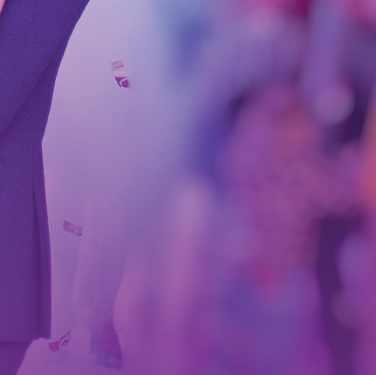


Village Hotel, Centennial Park, Elstree, WD6 3SB


ANTIQUES
Antique – Reproduction – Retro Furniture (any condition)
Epstein, Archie Shine, Hille, G Plan, etc.
Dining Suites, Lounges Suites, Bookcases, Desks, Cabinets, Mirrors, Lights, etc.
House clearances
Single items to complete homes
MARYLEBONE ANTIQUES - 8 CHURCH STREET NW8 8ED 07866 614 744 (ANYTIME) 0207 723 7415 (SHOP)
closed Sunday & Monday
STUART SHUSTER - e-mail - info@maryleboneantiques.co.uk
MAKE SURE YOU CONTACT US BEFORE SELLING



Family Company established for 30
clear houses, flats, sheds, garages etc. No
too
or too small! Rubbish cleared as part of a full clearance. We have a waste licence. We buy items including furniture bric a brac.
For a free quote please phone Dave on 07913405315 any time.


Confidential Bereavement Counselling for adults and children individually. Support Groups available. We offer in person, online and telephone counselling. Contact Jewish Bereavement Counselling Service in confidence. 0208 951 3881 enquiries@jbcs.org.uk | www.jbcs.org.uk
our Legacy Team on 020































